#i LOVE the concept of being intrinsically(?) linked to a monster(literally or not). a being that could kill you without any effort being by
Note
There is something so primal(?) in me that melts at the idea of small children with dark and dreary parental figures. It makes me all happy and calm and such, which is why I keep going back to your comic about Luffy trying to come up with a title for Croc.
I just love it so much...
I also have such a soft spot for Crocodile being trans and Luffy's parent, and man oh man...you are checking off all the boxes!!!
Anyways, back I go to read your little comic again /gen
!!! :DD i love the small child & scary parent that will doom the world for them dynamic, it's so interesting!
#i LOVE the concept of being intrinsically(?) linked to a monster(literally or not). a being that could kill you without any effort being by#your side no matter what. it can create all kind of fun (and terrifying!) dynamics. its because of this idea that i really wanted to explor#what the crocodad theory could lead to. the entire reason this au exist is 1 ive been obssesed with the theory since ive heard of it years#ago 2 i was rereading ace's death and then croco showed up to save luffy and jinbei and i just. the monster that protect oooh#crocau ask
20 notes
·
View notes
Text
A Review of Loki (2021)
[The following is an exact transcription of Twitter user @/diolesbian ‘s thread linked here . They gave me permission to cross-post their thread on my Tumblr. Keep in mind that this review is fairly long and quite critical of the series. I agree with this review wholeheartedly, and would be welcome to discuss it with anyone else.]
Loki is a character who has died many times, but his own series may be his most brutal character assassination yet.
1. Loki’s role in the series. Instead of tackling Loki's most villainous state of mind in Avengers 1, the series literally speedran through his development in the subsequent films, after which they almost entirely halted his character progression.
Because this series was set right after Avengers 1 it had the responsibility of developing Loki further in place of The Dark World and Ragnarok. In Episode 1, this development was kicked off by having Loki watch a reel of some of his defining moments in the MCU, allowing him to see his future all the way up to his death in Infinity War. Sadly, this scene ended up being the most development he received in the entire series. And arguably, this isn’t even true development but more like a speedrun of his character up until that point, serving as a simple tactic to explain why he wouldn’t be acting all dictatorial and murderous during his own series. As soon as he had been made “good” (read: docile) enough to follow along with the plot, his agency was completely thrown out. From that point on, the series wasn’t about Loki making things happen but about things happening to Loki.
Loki was supposed to be the main character, but he wasn't the protagonist in this story. In fact, he was more of a side character than we’ve ever seen him be in the MCU before, perhaps excepting IW and Endgame.
A protagonist is by definition someone whose important decisions affect the plot, whose development is followed most closely by the audience, and who is opposed by an antagonist. Loki exhibited none of these traits in this series. Especially the latter half of the story, he was reduced to simply reacting to the revelations around him, such as the reveal that the TVA members were all variants and that Kang was the true mastermind behind everything. He never truly involved himself or acted based on any of these plot points, and hardly played a key role in what was supposed to be his own story. Even in the films, where Loki is a side character, he makes choices which impact the plot to a larger extent. He almost seems more like a background character in the role of protagonist than in the parts he plays in the films.
2. The antagonist. The TVA could have worked as the perfect setting for Loki to have a new arc. It’s a thematic antithesis to who we know Loki to be. But when this Loki turns out to not be who the audience thought he was the TVA’s thematic significance falls apart as well.
In Episode 1, the TVA’s Agent Mobius enlists the help of Loki the Variant to pin down a greater foe who we are told is another, more malicious version of Loki. Order and chaos meeting in the middle, teaming up to take down an enemy, who even happens to be the protagonists’ literal evil self: that works, it sounds promising. But this dynamic is soon undermined when Loki leaves with Sylvie. Still, the benefit of the doubt is easy to grant here: a story about tricksters is bound to contain twists. But by Episode 3 the series is halfway done and the TVA has been appointed as the main antagonist again: we’ve now established villains three different times. And then the Cloud Monster At The End Of Time is introduced, and finally Kang. In other words, the Loki series has no consistent antagonist, no one to pit its main character against. And this is where we once again miss out on an enormous aspect of Loki’s potential characterization.
Protagonists are always defined by an antagonist, whether a purple Titan, a flat tire, or themself. Loki is not given anything to define his morals, motivations, or development in opposition to and this is a huge oversight. Especially given the fact that Loki has taken on the villain’s role in the past: how is the audience supposed to know that the “bad guy” is now a “good guy” if there’s no “even worse guy” to stand up against?
3. The plot. A plot should show off its MC’s strengths and match their personality. The Loki plot hardly relied on his presence at all, he didn't play a key role. The story had so little to do with Loki that it seemed as though he has barely any impact on “his” narrative.
One of the most central conflicts in the Loki series doesn’t involve him at all: it’s between Sylvie and the TVA. This plotline was a good concept overall, but its main problem is that it’s practically the only conflict in the series. Loki himself, as mentioned before, isn’t set in opposition to anything or anyone. And thanks to his relationships with Sylvie and Mobius being weakened by conflicting storytelling devices, he appears to be in a bubble by himself away from the rest of the cast for much of the story. First he follows Mobius around, then Sylvie, then he wanders aimlessly in the void before following Sylvie once again and learning that Kang is a Really Bad Guy who he should be opposed to even though by this point he has interacted so little with the story unfolding around him that the audience doesn’t even understand why he should be choosing to play the hero.
The plot and the characters both suffer by being so incredibly unrelated to each other. A series, especially an MCU one, should tell an overarching narrative through the perspective of its main character.
In the beginning of the series, when Loki was still getting his bearings in the TVA, this lack of decision-making was more understandable, especially since some of his skills were still being shown-- he discovered Sylvie was hiding in nexus events, and he made the choice to leave Mobius and follow her. But by the latter half of the series he still hasn’t had much impact on the story or taken any actions of his own, and simply allows plot points to happen to him. Just because the Loki series had to introduce the TVA and Kang didn’t mean it had to forgo telling a story about its protagonist. If Loki’s story had been intrinsically tied to the overarching plot points, if his choices had been some of the primary factors determining how events ended up taking place, the series would have succeeded in every aspect. But instead Loki is pushed aside by the plot of his own series, a plot which subsequently ends up coming across as largely hollow and pointless due to its lack of character drive.
4. Loki’s arc. One of the main reasons MCU Loki is loved is for his excellent character development across his films. TVA Loki was extremely lacking in that aspect and chances to take his character in interesting new self-aware directions were thrown away without much thought.
Throughout the MCU, Loki is on a journey with many highs and lows. He goes from a bitter and disheartened prince standing in the shadow of his brother, to a self-loathing Jotun bent on destroying his own people in a desperate attempt to win his father’s love, to a half-mad partially mind-controlled dictator with delusions of grandeur fueled by his own insecurity, to a prisoner wondering what there is left for him to lose, to a savior of Asgard’s people finally coming to accept his place in what is left of his family, to a tragic sacrificial victim who knew he had to die so the true hero might live on. That’s a hell of a journey, incidentally shown in less than TWO HOURS of screen time, and the prospect of TVA Loki embarking on an equally stimulating one, this time told over the course of over four hours and shown from his own perspective the entire way through, was exciting. But as it turned out, this relatively simple expectation went completely unmet.
For a story trying to say so much about individuality and self-acceptance, the Loki series seemed to pass by every obvious opportunity to tackle those questions.
Sylvie’s introduction seemed like a good idea at first: Loki would be able to literally bond with himself and learn to accept who he is that way, and forays could be made to explore what Loki’s personality could have been like if he grew up under different circumstances! But aside from a scene or two in Episode 3, this was not how things ended up going. Loki didn’t come to any grand or important conclusions about his identity, he didn’t choose to act differently, all that happened was a vaguely-worded confession of pseudo-romantic feelings which was cut off in the middle, made no sense, and weakened the narrative in a whole host of other ways explained elsewhere. Loki’s encounter with other versions of themself in the Void was similarly meaningless: Loki didn’t end up expressing or demonstrating a single thing he learned from meeting all of those alternate selves, despite the fact that there was potential for massive self-discovery there.
Less than 2 hours of MCU screen time portrayed Loki more coherently than this entire series. Loki is loved because of how much he changes, and it felt like he didn’t in this series. He started off lost and stayed that way throughout the entire plot.
By the end of the series, it was impossible to identify who Loki had become. He said he didn’t want a throne, but it was not obvious why not. He looked sad to be betrayed by Sylvie, but never expressed what that meant to him. He seemed afraid once Kang was unleashed, but why? Why did he care about the Sacred Timeline? What were his motivations? Throughout the series the answers to these questions became less and less obvious, culminating in the final episode which ended without a single moment of reflection or explanation as to who Loki had become. He wasn’t a villain, but only because he wasn’t murdering people. He was in some capacity a hero, for… being against Kang, probably, but once again with no explanation as to why Loki had decided to feel that way. He never seemed self-assured in his heroism, as if he hadn’t chosen the role for himself. Again, making one’s own choices that shape the narrative are what differentiates a protagonist from a side character, but Loki did not do that in this series.
5. Loki and Sylvie’s relationship. Loki and Sylvie had the potential to be a powerful duo representing the process of self-acceptance but instead they were reduced to a strange pseudo-romance.
Despite Loki’s many developments in the films, he never truly liked himself. He has been known to act extremely confident and self-righteous at times, but this is merely the opposite side of the coin containing his self-loathing and insecurity. Having him literally meet and subsequently befriend himself in Episode 3 was a move towards developing this aspect of him and potentially teaching him to finally accept himself as he truly is, but this buildup was all shattered in Episode 4 when the relationship is portrayed to have romantic undertones. Instead of a powerful struggle to accept oneself, the relationship between Loki and Sylvie becomes a twisted thing which is memeable at best (selfcest LOL amirite?) and outright damaging to both characters and the very concept of loving oneself at worst.
Ultimately, Loki and Sylvie's relationship didn’t add anything to either character’s development and actively detracted from what could have been a touching story.
Romantic love is extremely different from self love; romantic love has connotations including dating conventions and sexuality which are impossible to ignore and in this case serve as a distraction. And on top of ruining a potentially powerful storyline, this strange relationship makes both Loki and Sylvie seem out of character. Loki is once again one thousand years old and he has never even had a true friend, so why would he possibly fall for someone after knowing them for only two days? Meanwhile in Sylvie’s case, Loki’s “feelings” for her cause the audience to pay more attention to her romantic life and gestures rather than her actual character and motivations.
6. Loki’s Sexuality and Gender Fluidity. Loki’s sexuality and gender has been shown in several comic runs, and the series was advertised as featuring this representation as well. But due to several fundamental errors and problematic storytelling this also fell flat.
Sylvie’s introduction filled many fans with hope regarding the portrayal of Loki’s identity. In the MCU neither of their LGBT identities had ever been touched upon, while the series introduced a female variant of Loki and explicitly stated their sexuality. But this portrayal soon unraveled, most notably in Episode 5, in which many other Loki variants were shown but not a single one besides Sylvie was non-male. On top of that, when TVA Loki mentioned Sylvie and referred to her as “a woman Variant of us”, the other Lokis agreed that that sounded “terrifying”. Why should a genderfluid being be afraid of a version of themselves presenting as a different gender? It read as both fluidphobic not to mention strangely sexist.
The pseudo-romance between Loki and Sylvie only aggravated the situation. Not only did the nature of the “relationship” seem to follow heteronormative storytelling tropes (falling in love after a couple days of knowing each other, one party being reduced to a love interest, valuing romantic love above any other type, etc) but it also seemed distressing and offensive to many genderfluid people. A romance between a male and a female Loki, one of which doesn’t even call herself by that name, seems to be implying that an individual becomes someone else when merely presenting as a different gender, which of course isn’t at all the case. The writing wasn’t necessarily malicious here, but it was certainly ignorant and potentially even harmful. The opportunity was there to translate Loki’s powerful comic representation into the framework of the MCU, but this attempt did not succeed.
7. Loki’s characterization. Loki is a chameleon, but there are certain traits fundamental to his character. These traits were either ignored or actively mocked in the series. The audience already knew “what makes a Loki a Loki", but the series threw that knowledge away.
Episode 1’s premise of stripping Loki of everything he is used to was an intriguing setup to ensure the discovery of the core of who Loki truly is. The only problem was that this truth didn’t end up being found at all. Mobius made fun of Loki’s most defining traits, such as his habits of lying to manipulate people and acting out of a place of insecurity, which seemed to be a signal for the narrative to forbid Loki from exhibiting any of those traits from that point on in any way. This reduction in Loki’s character was reflected in everything, from his lack of humor (in the films he’s even funny while he’s taking over the world!), the underpowered way in which he fought against Sylvie (he’ll use magic to dry his clothes, but fight with a damn vacuum cleaner?) to the way that he wore the same boring outfit in every single episode-- it may sound shallow, but clothes are important when presenting a character. Every one of Loki’s looks in the films said something about him and his state of mind, and sadly that bland TVA outfit seemed to convey that Loki really was nothing more than a subservient pawn in what was supposed to be his own story. Ironically, the writing stripped Loki of everything that made him Loki, and left us with nothing but a Jotun-shaped void to be swayed by the whims and wills of the characters and plot devices surrounding him.
8. Loki’s past and abilities. This series could have elaborated on aspects of his character which had been teased at in the films and theorized about by fans, but ended up being a disappointment in this aspect as well.
Aside from Loki’s characterization and development, something else the series ignores is much of his canon story in the films. Since Thor 1, a truth that always overshadowed Loki was his Jotun heritage. He struggled with it up until the time of his death, clearly visible in his relationship with his foster family. It’s understandable that Loki was supposed to be independent from Thor in his series, but that’s no excuse for completely ignoring this central part of who Loki is. It doesn’t matter how much he goes through or how much his circumstances change, this feeling of unbelonging sits deep in Loki’s core and should have been both explored and explicitly discussed in the series. A series all about Loki was the perfect opportunity for him to finally confront and explain his relationship with his heritage, and potentially come to terms with it as well. And this isn’t even to say how cool some more insight on Loki’s Jotun inheritance could have been-- hypotheticals aren’t the point of this review, but it would have been fascinating to see Loki reacting adversely to heat like he has been hinted to in the past or even using his ice powers like he did in Thor 1.
Loki's magic was tragically underused. It felt like he was stripped of all of his magical powers even after his TVA chains had been removed, and this was never explained.
A second huge oversight is his magic. His powers are all over the place in this series. They were always a bit vague in the films, but this series was the opportunity to set that right and explain exactly what Loki was capable of as a sorcerer, especially now that the MCU has embraced magic more than it had ten years ago. But instead, Loki showcased an inexplicable lack of magic use-- again, the vacuum cleaner fight can be presented as evidence. There is a single scene in which Loki says that he learned his magic from Frigga, but no information is given as to how much he learned or why he doesn’t always favor spells. His power levels are incredibly inconsistent (he forgoes using magic when first confronted by the TVA, but is later shown using telekinesis to save himself from being literally crushed to death). And, strangest of all, there is a scene in which he tells Sylvie that he “can’t” enchant living beings. Loki, the millennium year old Trickster sorcerer god, who can hold an Infinity Stone with his bare hands, reanimate Surtur in the Eternal Flame, and trick the average person using illusions with ease, can’t cast a little enchantment? And if so, why not? The series offered precious few explanations concerning Loki’s magical abilities and instead only raised more questions. And in this way, Loki is once again relegated into the background and left with not a single shred of any new characterization or development.
Loki contains multitudes, but the series reduced him to two dimensions.
This isn’t to mention every other facet of Loki’s story that could have potentially been explored to great success in this series-- his torture and subsequent partial mental influence at the hands of Thanos just before the events of Avengers 1 is one obvious example, as is his youth on Asgard, as are his suicidal tendencies (people don’t tend to survive falling off the Bifrost, and he knew that when he threw himself off of it), plus infinite other facets of him. Of course, it was both necessary and more interesting for this series to be its own story rather than one which lingered on past films-- but that’s not to say that none of these plot points should have come back, at least subtly, to play a role in this story. Plot points exist to be brought back later, not completely ignored. Otherwise a story may as well be written about a completely original character.
#loki#loki 2021#loki disney+#loki discussion#loki discourse#loki spoilers#lokius#loki x mobius#loki x sylvie#sylki#marvel#marvel discourse#loki review#mcu loki#loki series#loki season finale#loki season 1#loki ship
92 notes
·
View notes
Text
watching ONE write women
One of the joys of following a writer for a while is that you get to follow how their ideas develop. One of the things that ONE brought up in an interview (annoyingly I’ve lost the link) was that he didn’t think that he wrote women particularly well.
I was thinking about that. When ONE says that, what comes across to me is that he has no problem writing a female character as an individual rather than a role. All the girls and women he’s written so far have their own voices, own their problems, and have something to do within the story that would be noticeable if they weren’t there. Quite frankly, that alone is over and above what various tests of representation (such as the Bechdel test) ask for.
What he’s not so good at is appreciating what being female brings to a character’s experiences and outlook. But he’s not just left it at that. More on what he’s been doing in a bit (and under the cut).
“...the law forbids rich and poor alike to sleep under bridges...” -- Anatole France
With his sharp eye and talent for exploring the implications of whatever he posits, ONE has brought up some issues are not inherently gendered, but usually are.
A: Childcare
Metal Bat appears to be the main, if not sole, carer for Zenko. How it affects him is fascinating. He’s one of the longest-serving heroes in the Hero Association, being there before Class S was formed, literally within the first six months of its establishment. He’s been extremely loyal and is highly trusted by the HA -- they put Narinki’s life into his hands without fear. His battle strength is literally praised to the heavens.
Metal Bat makes Zenko a priority, structuring his availability around her school schedule and being present in her life. He gets very angry if these times are threatened without overwhelmingly good cause. His reward is to be perceived by the Hero Association as less committed and so they under-recognise him in terms of ranking, and since rank and pay are linked, under-pay him as well. It’s a story all too many women can relate to. But that’s not all.
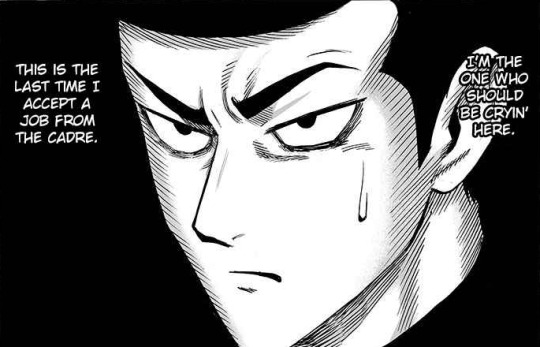
Because ONE writes so simply yet conscientiously, something else comes up and has a peek: intersectionality. It’s the concept that we often have multiple social disadvantages that interact and compound our problems. The first is sexism. Regardless of whatever childcare policy the HA has, the sexist assumption that only women care (for the record: this is bullshit) makes it unlikely for them to ask Metal Bat. Second, social capital. The fact that he’s Zenko’s sole carer means that he has low social capital, that informal network of people around you who can help out -- or tell you where to find help and what things to say in order to get that help. [Aside: this is why programmes to help people, unless they reach out aggressively, tend to disproportionately attract those who need it least.] Metal Bat doesn’t have the knowledge. The third is the challenge brought by his being a 17-year old boy. He’s quick to perceive challenge as threat, and threat as something to be met by anger. Witness him threatening to smash the HA headquarters if it turns out that he’s missed Zenko’s piano recital for nothing -- completely not useful to anything. [Another aside: the importance of learning to disambiguate emotions and do useful things with them even if it means being vulnerable as a part of growing up as a man is the whole point of Mob Psycho 100.]
What do the Neo Heroes do? They ask Metal Bat if he wants help with childcare AND HE JUMPS SHIP PRONTO. If that’s not an indictment of the Hero Association, I don’t know what is.

B: Emotional Labour
Saitama has been delegating more and more of the day-to-day work to Genos. What started as an act of service to express his gratitude, respect and love for Saitama is increasingly turning into a second job for Genos. It’s not just the cooking and cleaning and the shopping and the bailing Saitama out if he’s forgotten his wallet again, it’s also the worrying about Saitama, sometimes at inappropriate times. Has he drunk enough water? Has he clean clothes in good repair? What sales is he looking forward to? Have they been marked on the calendar? It’s honestly not doing Genos any good, and it’s one of those things all too many frustrated wives and girlfriends can relate to. This doing the practical and emotional work for another is not intrinsically gendered, but funny how often it breaks that way.
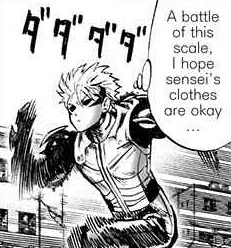
It’s not doing Saitama any good either. He’s using this freed up time to fritter his life ever more aggressively away, playing games with King and finding pointless competitions to enter, all while complaining about feeling less and less connected to anything (if you don’t address the problem, it doesn’t get better, duh!). Worse, he’s started to take that gift of service for granted, witness him airily telling King how he’ll just have Genos go clear up the mess of monsters he’s left outside the flat. I was heartened to see what happened when Saitama went a little too far and asked Genos to go cook and instead of jumping up, Genos gave him the the evil eye and let the awkwardness hang there. That was good -- there’s hope for this guy yet.

Speaking of Genos, he also over-functions for something else Saitama struggles with: advocating for himself. He tends to have Genos be the ugly one so he doesn’t have to be. You can see just how bad he is at self-advocacy when Forte and friends could invite themselves into Saitama’s house at will despite his protests -- and it stopped the instant Genos showed up.
In a sense, it’s not surprising that Genos can do that. When you’re differently-abled (and for once, this is not a euphemism) as he is, being able to clearly ask for what you want and need is life-and-death necessary. If Genos was shy about it, he’s long since had to discard that. But! Let me point to a nuance the story touches on. How pushy you can be without being punished for it depends a lot on who you are, intersecting strongly with race, gender, social status, etc (remember my mentioning intersectionality before). What’s called assertive in a man is called bitchy or sharp-elbowed in a woman. Even taking gender and race out of the equation, there’s still a noticeable difference in the way the world treats Saitama and Genos. You don’t need to be Sigmund Freud to understand the way the short, ugly Dr. Kuseno sweats making sure that Genos positively radiates youth, beauty, wealth and power. That’s part of his right to ask and be taken seriously. You can see how drastically different it is for Saitama, even from his middle school days. Genos notices, and makes sure to leverage his social power for Saitama.
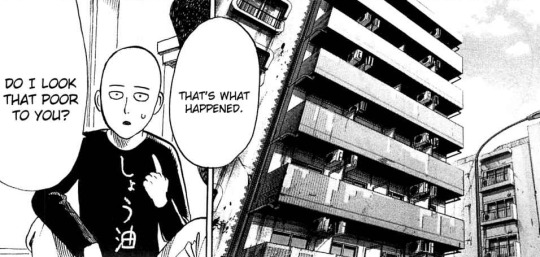
What I love about these examples are that by not automatically heaving a woman into these characters’ roles, ONE’s brought a less frequently seen angle that illustrates the problems they deal with are not ‘womens’ issues per se but are rather inequities that disproportionately affect women -- which is at the heart of what feminists keep saying. When you read Makai no Ossan, you can appreciate that ONE could have gone with female characters and done a great job, but his choosing not to has brought a very welcome dimension to the story.
Women proper
“I’m not like other girls”
Still, bit by bit, ONE has been working more women into his stories. After his interview, the next thing he worked on was the single-volume sequel to Mob Psycho 100, Reigen. He took his challenge head-on by making the POV character Tome and putting her in an all-girls’ high school.
Throughout the story, we see Tome thinking of herself as special, better than her fellow classmates, whom she sees as vapid and shallow. The denouement comes with Tome being humbled as she gets to know her classmates better and realises that they pursue interests just as varied and weird as hers -- only they’re also practicing being socially adept on top of that.
It’s a gentle story, but it’s still a great side-swipe at self-internalised misogyny, the idea that it’s shameful to be like a ‘girl’ and it’s something to distance oneself from. Fortunately, Tome can laugh at herself and grow up.
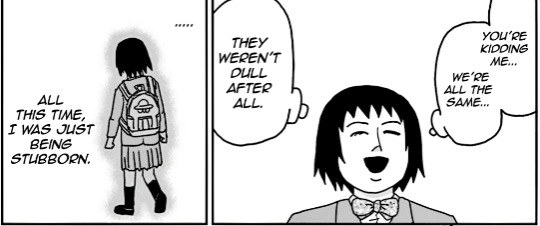
“Ha ha ha”
For a long time, the only (named) women we had in OPM were Tatsumaki and her younger sister Fubuki. We’ve gotten more women both good and bad: in particular, it’s been very gratifying to find that one of the most dangerous, story-shaping villains in the story is Psykos.
In the webcomic, ONE’s pushed even further. A recent Tweet featured him talking about how hard he finds it to draw women. And he’s added several. No same-face for him! I’ll talk about the new heroines he’s added, but first, let me draw your attentions to something most artists don’t realize they do: massively skew the gender distribution of crowds, even when it is incredibly illogical to do so. With ONE, even drawing the crowds at the fair who gaggle at Amai Mask, he’s got a far more even balance of women and they’re not all young and pretty -- which is much more true-to-life. He’s in the business of drawing people.
ONE has featured microaggressions before, particularly in the way Fubuki can have perfectly sound things to say and be totally ignored, but he brings it properly to the fore with Suiko. No one calls her incompetent, but the little put downs she gets when she puts herself forward for the hero test in lieu of her brother, oh they’re well-observed The look on her face just makes it. I love the way she shut the recruiters up subsequently.

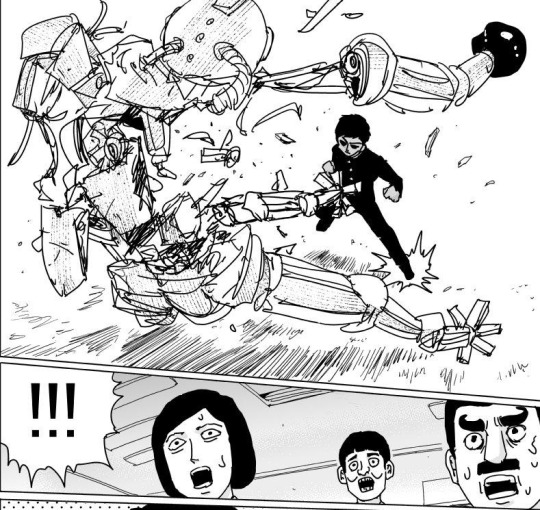
Let’s conclude this tour with a look at Webigaza’s lonely figure. We have another mono-manically focused cyborg in the story. Genos has been called a lot of things -- determined, obsessive even, but crazy? Never. Notice who it’s been reserved for instead. It’s no slip of the tongue.
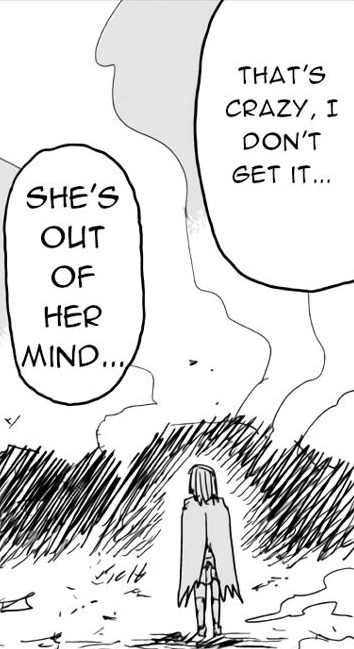
Wrapping Up
I’m of the impression that ONE really wants to try to capture as much of the human experience as he can in his stories, however whimsical or fantastical the stories themselves are. I’m disarmed by his humility in accepting that he’ll never have the lived experience of half the world’s population but he sure as hell can put some effort into learning how to to writing well-realised, believable, female characters.
I watch ONE’s continued development as a writer with interest.
#OPM#Reigen#ONE#meta#long#women#female characters#I like that ONE treats women not as creatures whose problems and experiences can't possibly be understood#but as people first and foremost#perfect? No and who is#ongoing and adding to his understanding -- yes
136 notes
·
View notes
Text
burning embers
Modern Au: Zuko centric + The Gaang + Zukka + Friendship/Family feels + Angst and Fluff.
Summary: Zuko learns the meaning of love.
Read on Ao3 here.
.
There’s something so tragically painful about falling in love, they say.
But Zuko wouldn’t know. He doesn’t know what falling in love with someone is, he doesn’t know what it feels like. Love is a concept so alien to him; he can’t even grasp the root of it. He just knows a broken home, the remaining ashes of a devastating, blazing fire that was supposed to be his father’s love.
He doesn’t know what love is. And yet, he understands: the underlying and heart-wrenching agony that comes with loving. The sorrow that comes with it; it is just there, intrinsically linked. It’s something that the small kid—full of unknown love and golden warmth, but also deep, bitter pain—comprehends at the tender age of 11.
It’s just common knowledge for him, the same way he knows the sky is blue and the sun hides at night.
Family. Love. Father.
Those words don’t have meaning, Zuko thinks, lying on his bed one night, still hearing the disappointment in his father’s voice echoing in his ears in the quiet darkness of his room. They’re there, of course. And he knows them. He can say them. But they feel far away, slipping through the space between his fingers, becoming dust that blows away with the chilly wind of an autumn midnight, escaping him before he can place what was there in the first place.
They don’t hold weight. They don’t mean anything. They’re shallow; they just exist, like a couple of letters strewn together, like when you say your name so many times in a row it doesn’t even feel right anymore; but, he supposes only a few people are blessed with their significance, with tasting them in their mouth with something not akin to hate or bitterness or emptiness.
Loneliness. Despair. Dishonor.
Those have meaning. Those have weight, despite being such empty words.
(But they very much taste like something akin to hate, too—and that’s the thing.
Maybe Zuko just doesn’t know anything aside from [self-]hate.)
.
.
Family, love, father. They are concepts that come alive to him the same way a phoenix is born.
They rise, awakening from the ashes that the fire within themselves has burned to death; so beautiful, so mystical, so mesmeric and so incredibly fragile and precious and wondrous, like a mythological creature coming back to life after having known its own death.
He learns the words and their meaning the same way his brain starts learning new things and concepts by reading a book; but he doesn’t learn with his mind—even though a part of him knows that this is where knowledge is stored—Zuko learns with his heart (he has always learned things best with his heart; after all, Zuko wears it on his sleeve; he’s emotional, visceral, volatile—his feelings are way too intense, too much that they burn his chest open; he’s always aflame), with his eyes, with his hands. He learns it in every little gesture that’s given to him, in every little crack (that keeps filling and filling and filling) of the time that goes on, in every little drop of ink that is spilled on the parchment where his life is being written.
He learns the words in the way he begins learning his uncle's tea recipes, in the satisfaction and pride he feels when his uncle congratulates him for a job well-done on a warm, quiet Saturday afternoon as he finishes helping cleaning and serving the tables around the teashop, in the way his favorite cup sits next to his uncle's on the kitchen counter in the mornings, full of Zuko’s favorite bubble tea; he learns them in the ugly, endearing, oversized sweater hanging at the back of his closet, the one his uncle gave him in his last birthday; he learns about love in the gentle smiles of weekends, in the singing of the birds outside his room’s window, in the blanket that rests around his shoulders when he is sitting on the comfy couch on a calm Thursday night, dozing off while trying to study for an English test, in the way the nightmares that used to haunt him are tormenting him less and less every time; he learns the meaning of father in his uncle's ridiculous pajamas, full of tiny drawings of cherry blossoms and tea leaves, in his uncle’s obsession with Pai Sho, and in the wise phrases he keeps throwing at Zuko even when he cannot fully understand them.
He learns, little by little, step by step, like a slow fire burning inside his guts.
And it's a weird, strange thing. Zuko learned that fire hurts you, the same way he learned that love does, but somehow, after years of building his new life, it doesn't feel that way anymore.
His uncle is patient with him. Patient as someone who would teach someone else origami or as someone who’s slowly writing a book. He teaches him, sees him fall, stumble and trip over his feet (both, metaphorically and literally speaking) and he’s there when Zuko gets up again.
It’s a nice feeling. Knowing that someone is going to be there, even if you fall. Even when you fail.
His uncle teaches him, the same way he creates a new tea receipt for the menu; carefully, gently, ever so softly. He takes Zuko, the broken child who looks at him through his pain and hatred, and makes him open his eyes. He points out, over and over and over again, that failing is not a bad thing, that love exists and that it doesn't have to hurt, and that if it does, you can heal from it; he teaches him that Zuko is full of it, full of love, he says that he’s always been.
Somehow, it feels a bit like healing. Of course, Zuko is still broken. Probably, a part of him always will be; but, somehow, he doesn't think that being a bit broken is so wrong now.
.
.
Friendship was a foreign concept to him, too. Or maybe not, but Zuko never wanted to get involved with it.
Too much trouble.
(Or maybe fear—fear of what it carries, what it holds in its nature; fear of failing, of not being enough, of being left out, of getting too attached.)
But just as Zuko was wrong about so many things in his life, this is not the exception.
He comes to learn that, too.
It’s a different process than with his uncle. Maybe because it’s slower, or maybe because it’s, rather, faster. Maybe because he wasn’t aware he was learning at all.
Zuko doesn’t know exactly when it starts. Can’t pinpoint the exact moment he started getting involved. Not that he cares much about that at this point, but he would like to know.
They kind of adopt him in their group (or, er, gang, as they call it), without Zuko noticing. But to be fair, Zuko doesn’t notice a lot of things.
Toph is a friend of his Uncle, and she lives near the teashop, so she’s around more time than she’s not; she’s loud and kinda rude, and always calls Zuko a dork or a nerd or an idiot, but Zuko realizes he likes when she’s there. Aang comes along sometimes, with his scarily bright smile. There’s also Katara and her big brother, Sokka.
He likes all of them, to his extreme surprise. They’re all good people. Aang is way too kind, Katara may be scary but she’s pretty cool, and Sokka is just a combination of a very, weirdly endearing, smart dumbass, which is, uh, new.
He honestly doesn’t know how it happened, or when it happened, but suddenly he’s tucked under a soft fuzzy blanket in winter, sandwiched in the middle of the three-spot sofa, with Aang almost laying over his lap. He’s almost sitting on Sokka’s right leg, pressing him against the arm sofa, his side overlapping with Sokka’s. He doesn’t seem to mind, though. He’s sitting there, cross-legged, with his right arm fully extended on the back of the sofa, almost like he’s hugging Zuko’s shoulders; he’s practically leaning on Zuko.
His arm and his side are really warm, though. Not as much as Zuko generally is, but it’s… kind of nice.
“Katara, Titanic is a classic, dude. What the hell.”
Zuko takes a sip from his hot chocolate, blowing off the clouds of steam gathering over the cup—the warmth of it is pretty welcomed in his throat, to be honest, while Katara rolls her eyes at her brother.
“I’m not watching that for the fifth time in a month and seeing you and Aang both cry for an hour later after the already three long hours of the movie.”
Sokka looks pretty indignant about Katara’s attitude towards his (probably) favorite movie, which is pretty amusing.
“You’re just a monster,” Sokka says, dramatically, “that’s why you don’t cry.”
Katara rolls her eyes again.
“I don’t know,” Toph says, from the couch closer to the TV, sprawled all comfortably over it. “It’s actually a really funny movie,” she points out, and then draws out her voice. “‘Jack, draw me like one of your French girls’.”
Aang laughs pretty loud, and Zuko smiles at the bad impersonation despite himself.
“Well, My Heart Will Go On is my anthem.” Sokka says, puffing out his chest.
Zuko actually snorts into his cup and Sokka shoots him a look. He remembers the time Aang and Sokka recreated that iconic scene, with Toph singing at the top of her lungs in a ridiculously obnoxious voice. He actually laughed at that.
Sokka seems to read his mind, because after a few moments of staring at Zuko’s face, his entire expression lights up. He grins, eyes sparkling, and starts singing really loud and purposely out of tune. Aang starts laughing and Toph doesn’t waste time on joining Sokka in singing. Even Katara smiles.
A few minutes later of terrible singing, they’re all laughing. Toph is cackling so hard she’s on the floor, and Sokka keeps leaning over him, laughing in his ear. He believes it should be annoying, but instead of that, it’s actually infectious and Zuko laughs a bit harder.
After they calm down, Toph is clutching at her sides and Sokka is wiping tears out of his eyes.
Aang smiles, then, softly and content, and raises a hand in the air, like asking for permission to talk.
“I have an idea.” He says, and turns around to look at him. “Why don’t we just let Zuko decide? He hasn’t chosen anything yet for our Friday movie nights.”
All eyes turn to look at him at that. He stops his movements, mouth hanging open, hot cup halfway to his lips.
“Uh,” he frowns. “Thank you, but, um. Why would I choose? It’s your thing.”
Everyone stares at him like he has two heads, which, okay fair but why.
“What?”
Aang gives him a soft smile, all kind eyes and gentle features, like he’s about to talk to a baby, but before he can say anything, Sokka is putting an arm around his shoulders and leaning all his weight on him, as if they weren’t already close enough.
“This is your thing as much as it is ours, dude.” He says, grinning, “You’re one of us.” He vaunts, proudly, and ruffles Zuko’s hair.
Katara nods, at the same time Toph goes:
“Yup, you’re already in, loser.”
Aang chuckles. “Yes, you’re our friend, Zuko.”
Zuko blinks, stunned.
That’s…
There’s…
That’s… the F-word.
Friend.
Friend.
Huh? What? How? When did that happen? Huh? Did he miss something in the past few months?
Sokka, completely oblivious to his emotional turmoil, insistently points to the TV while squeezing him. "So, buddy? Don't you think we should watch Titanic to cry and share a couple of very male tears?"
"You only want to watch it because you have a crush on both Kate Winslet and Leonardo DiCaprio." Katara accuses.
"Nuh-uh!"
"Yes, you do! You even still keep that poster of them behind your…"
"Katara!!!!"
.
.
Friend.
It’s a nice word.
It tastes like hot chocolate in his mouth on a cold night, it sounds like Sokka’s laugh and Toph’s jokes, and it looks like Aang’s kind eyes and Katara’s nice smile.
It feels like something. It holds meaning. It’s not an empty word. At all.
Sokka’s hand ruffling his hair or over his shoulders, Toph’s nicknames for him, Aang’s offer of help in times he feels like Zuko needs it, Katara’s help with homework and advice on his recipes doesn’t let him forget that. ‘Friend’ is never going to be an empty word.
Friend tastes like hope, like warm food and bear-hugs.
Friend is such a nice word.
.
.
The thing with Zuko being generally—and strangely—warm all the time is that summer is a complete nightmare for him.
He's sitting directly in front of the fan at full power, barefoot in just jeans and a light T-shirt, and yet he still feels like he's going to explode. The weather forecast in the morning heralded a heat wave in midsummer, and it's exactly the worst thing in the world that could happen to Zuko's already overheated body. Toph groans beside him, lying with her arms and legs spread like a starfish on the cold ground. It is no comfort to her, however, and Zuko can understand that well.
Katara is looking at something on her phone, fanning herself with a magazine, and Aang remains practically unaffected, just as energetic as ever as he eats the remaining watermelon slices from the bowl they recently filled.
Zuko is wondering if he should go, or if he should fall asleep on the freezing ground that doesn't seem to be freezing at all, when Sokka walks into the living room in his baseball uniform. He has just returned from his morning summer practice; sweat is running down the side of his face, and his shirt is partly sticking to his body from the moisture. He smiles at everyone in greeting before gulping down all that's left of the water on the bottle of his hand. Zuko stares at his Adam's apple bob while he's drinking, and then his eyes trail the trickle of water that slides down his jaw over his desperation to drink all the water so fast. The drop goes down, down, down, dripping over his collarbone and sinking into his neck until it eventually gets lost somewhere inside his shirt. Sokka throws the bottle over the trash can and uses his shirt collar to wipe the water and some of his sweat off his face. Zuko's eyes unconsciously move downward; he can see a line of skin on Sokka's abdomen and stomach.
He swallows. Uh. His mouth is suddenly very dry. He's probably dehydrated. Is he dehydrated? He's starting to feel a little dizzy.
"So? Beloved friends, beloved little sister? Did you miss me? Obviously, you did."
Katara rolls her eyes, but still asks, "How was practice, dumbass?"
"It was cool! I hit twelve curve-balls in a row and sixteen of that weird fastball Suki pitches. Oh! And I'm finally getting the thing about that forkball. Also... woah, Zuko, are you okay?!"
Zuko blinks from where he was staring at Sokka's hair. It's kind of wet. Is that sweat? Shouldn't that be gross? Why is Zuko staring? Does he find it gross? He doesn't think so, but he also can't quite explain why...
"Woah, bud," Sokka says, kneeling in front of him and getting dangerously close to his face. "You're so red, are you having heatstroke or something? Do you feel dizzy?" He leans on his knees and presses a hand to his forehead, pulling up the bangs hanging over it. It feels nice, actually. Sokka's soft hand on his boiling skin feels like fresh water. He kind of wants to lean into it.
He probably does, because Sokka frowns. "Maybe you have a fever..." His mouth presses into a thin line. "Don't you want to take a shower to cool off? I can lend you some clothes, we're about the same height, they'll fit."
Zuko blinks. Huh?
"Here, let me help you." Sokka says, helping him up.
Around an hour later, Zuko feels a lot better, laying with his back on the floor in Sokka's baggy shorts and blue T-shirt with a cartoonish drawing of The Pink Panther. Zuko smiles involuntarily when he looks at it. It smells a bit like Sokka, or at least the detergent he uses. That makes his stomach do weird flips. He's not feeling that hot anymore, but maybe he is getting sick...
"Hey," Sokka tells him, looking at him from above, standing just behind Zuko's head. His toes are barely avoiding touching Zuko's sprawled hair on the floor.
"Hey," Zuko answers back, looking up at Sokka's soft face. His hair is down and still wet from the shower, and a few drops fall on the bridge of Zuko's nose when Sokka hovers over him. Zuko's face scrunches up, more out of involuntary reaction than out of bother, but Sokka chuckles.
"Sorry," he says, not sounding sorry at all. He uses the towel around his neck to messily dry his hair. "You look a lot better, now."
"Yes," Zuko muses, still a bit mesmerized by Sokka's wet hair. And Sokka's face. "Thanks."
Sokka grins brightly at him. "Sure."
He looks like he's about to say something else, but before he can say anything, Toph groans just a few feet away, sitting now on the couch. "Stop flirting and get a room already; it’s gross. We're here, too."
"What? We weren’t—"
Katara agrees, quietly.
"Hey! I was just worried!" Sokka excuses himself. "Weren't you all? His face was as red as a tomato."
Katara looks up from her magazine and gives him a pointed look, with one elegantly arched brow. Apparently, she doesn't even need to say anything else, because it's enough to make Sokka blush.
Oh.
He's cute, Zuko thinks. And then, oh, I think Sokka is cute. And then Sokka stomps over the kitchen muttering unintelligible things, still a faint blush over his cheeks.
Zuko smiles to himself watching his childish behavior. He is, though. He is cute.
.
.
.
It's raining heavily outside, drops pouring loudly against the asphalt of the sidewalk.
Zuko side-glances at Sokka. Maybe it's because after the course of a year, Zuko has learned to recognize many of Sokka's little gestures, or maybe it's the fact that the boy has been so much into his own mind lately, but Zuko recognizes that way he scrunches up his nose, that wrinkle between his eyebrows, that way his eyes twitch.
“Are you okay?”
He’s asking mostly just to be polite, to be honest; he already knows he’s not. He knows something’s up.
Sokka turns to look at him, and then stares at the rain hitting the glass window of the lonely teashop.
“I’m…” He says, and looks at his hand. Then he presses his mouth into a thin line.
“You don’t need to talk about it if you don’t want to,” Zuko says, awkwardly, because as much as he cares, he’s still a mess when it comes to social cues. He’s never going to stop being a mess. And terrible at comforting people.
Sokka sees right through him, though, like he always does, and smiles softly at him. His whole face mellows. It kind of makes Zuko’s heart flutter in his chest, like a butterfly flapping its wings.
“I’m…” Sokka tries again, looking at Zuko’s face. At his eyes, at his scar, at his neck. He feels weirdly exposed, but at the same time… He doesn’t. It’s just Sokka. Which means it’s okay. “Scared, I guess.”
Zuko blinks and tilts his head to the side. He’s not sure if he should ask, but…
“Of?”
Sokka gives him a wry smile.
“Of failing? Of disappointing my dad? Of not being enough? I don’t know, I can’t quite pick a single one.”
Sokka’s voice is not quite bitter, but it feels like that, in the air around them. Zuko knows the feeling pretty well.
“You are enough.” Zuko affirms, without a single trace of hesitation in his voice. Because Sokka is enough, in every single aspect, and he shouldn’t feel like any less than that. Zuko’s also aware of what he’s worrying about, and for Zuko, it’s just absurd—Sokka is one the very few people that shouldn’t worry about passing the entrance exam of college at all, he’s crazy smart. He should know that. But, to be fair, Zuko can’t judge him nor scold him for self-doubt when it used to be all that he was, along with his self-hate. So he says it out loud, looking into Sokka’s wide, surprised eyes. “You’re also really smart, Sokka, I’m sure you’re going to ace the entrance exam. You shouldn’t worry.”
Sokka rolls his eyes, but he also adopts that playful-kinda-flirty side of him. It’s painful because Zuko can see the sadness underlying in his voice and body language so clearly. Can see the lack of confidence in every single motion.
“You’re just saying that to make me feel better.”
“I am,” he agrees, “but it doesn’t mean it isn’t true. I really believe so. You’re the smartest person I know. You’re very capable of doing whatever you want, so have faith in yourself just like I have faith in you.”
Once he says it, and Sokka blinks once, twice, thrice at him, Zuko feels painfully aware (and painfully embarrassed) of what he just said.
Oh Lord, what did he actually…
“Ah,” Sokka says, and makes a face that Zuko can’t name. “You’re blushing.”
Zuko covers his cheeks with both hands. Sokka is probably right, they’re so warm, but still.
“I’m not.” Still.
Sokka laughs, and raises both eyebrows. “You sure?” He asks, staring pointedly at his face, which only makes him blush harder.
Stupid Sokka.
He must know the effect he’s having on him, because he laughs again, lightheartedly. Well, at least he’s not upset anymore…
“I’m not,” he uselessly and pathetically insists, even when it’s tragically obvious he is. But he has some pride, okay.
Sokka grins, but it’s all devilish. It makes Zuko’s hair stand on end. A chill runs down his spine.
“It’s just hot.”
Sokka smirks. “Sure, you’re always hot.”
“Shut up,” Zuko complains and groans, facing away from him so that he can’t see his blatant embarrassment. Sokka’s natural flirty personality wasn’t that much of a problem back then, but it’s only gotten worse, and Zuko just can’t handle it sometimes. It feels like way too much.
“Ah, but you blush when you’re embarrassed. That’s cute.” Sokka points out, a wide grin on his face. “Imagine being both cute and hot, what a crime.”
He sighs theatrically, and Zuko is very tempted to answer, “shut up, look who’s talking,” but he knows he will just get more embarrassed after saying that. He needs to calm down. So he just grumbles while Sokka laughs.
Then, when Sokka has already calmed down and Zuko can feel his face like normal again, they look quietly at the rain, steadily keeping its pace.
“Zuko,” Sokka says, after some time, and Zuko quirks an eyebrow in reply.
Sokka smiles. “Thank you. For believing me. It means a lot.”
Zuko smiles back. “Of course.”
.
.
Zuko notices it one night. (Though, looking back, it’s weird he didn’t notice it before.)
Well, more like, Aang notices and points it out, and then Zuko realizes that what he said is pathetically true, lying in bed at night because he still mulls things over sometimes before going to sleep.
“You know,” Aang had casually said, holding a can of orange juice, sitting next to Zuko on the bleachers at one of Sokka’s practice games. “You stare at Sokka a lot.”
Zuko frowned. “It’s his game, after all. We’re here to watch him,” he had retorted, like it was obvious.
“Well, yes, but I don’t mean only now. You stare at him all the time.”
Zuko didn’t feel like he liked where this conversation was going. Something about his expression must had given him away, or maybe Aang was just too good at reading him now, because he said:
“Wait.” He actually had sounded surprised. “You mean you’re not aware you have a crush on him?”
Zuko’s eyes went wide. “What? I don’t have a crush on him.”
Aang quirked up an eyebrow. Sure, he didn’t need to say.
“I don’t,” he had pressed on.
Aang hadn’t looked any more convinced of what he had said. If anything, he looked more convinced on what he himself had said. Aang had looked at him for a very long period of 1 minute before lightly chuckling and nudging him in the arm with his elbow, smiling brightly at him.
It was weird, but Zuko has gotten better at reading them, maybe just as much as Aang has with him. Maybe that’s why he knows what Aang means with all of that. Admit it when you’re ready.
It’s not like he was trying to deny or hide it. It’s not like he was trying to lie. He just didn’t think Aang was actually right.
But he is. Zuko can’t stop looking at Sokka, all the time. Thinking about him. About the way he smiles, with his hair up, with his hair down, with that denim jacket that fits him in all the right angles, with his baseball cap, ecstatic after he scored a run in the 8th inning.
Sokka, practicing on the field. Grinning widely and openly and hugging him tightly when he aced the entrance exam. Leaning in to taste Zuko’s ice-cream into his own mouth. Ruffling his own messy hair. Wearing those silly cartoon t-shirts. Serenading Zuko with Electric Love and the most ridiculous voice ever on his birthday as a joke. Messy eating. Scrunching up his nose while drinking green tea. Reciting 80% of the Star Wars dialogues by heart. Being obsessed with boomerangs and swords (though not as much as Zuko is with that last one). Biting into the end of his pencil when he’s focused on writing an English essay.
Ahhhhh.
Oh, holy honor.
He has a crush. A crush. Feelings.
When did that happen? Why did that happen? He doesn’t know. Was it because of his warm eyes? His pretty smile? His pretty lips? Was it because he opened up to Zuko, let himself be vulnerable around him, bled his heart out so Zuko could piece it back together? Was it because he’s funny? Charming? Cool? Smart? Astonishingly cute? Was it because he made Zuko feel made out of thin air, sometimes, so raw and exposed but yet so safe, so comfortable in his own skin? ...That is, the others don’t necessarily make him feel unsafe, or uncomfortable. He just feels like he can be all open and vulnerable with Sokka better. Maybe because he opened up to him first, about something so personal like his mom (and Zuko knew about losing a mom, too).
Well, whatever the reason, it doesn’t exactly matter, does it? He’s already in deep.
Zuko rolls over his stomach and sighs, groaning loud into his pillow. Why, why, why, why. It’s not like he even has a chance, so why did he have to…
Ugh.
Feelings are stupid. His heart is stupid.
And the way he falls asleep thinking about Sokka’s laugh is even stupider.
.
.
The thing is, because Zuko notices all the little details in Sokka’s gestures and behavior, he also notices the way he acts differently towards… Certain people.
“Me and Yue?” Sokka laughs, and Zuko blinks. He didn’t even mean to ask it out loud. Now, he would just hear the confirmation of what he already knew from Sokka’s lips. How is that any better? Good job, Zuko.
“Nah, man, Suki would kill me if she sees me wooing her girlfriend. Or at least kick me pretty damn hard.” Huh? Zuko blinks again. Huh? So they’re… Sokka and Yue… They’re not…
“And believe me, she’s super strong. She kicked me once and I’ve always regretted eating that last cupcake on the fridge.” Sokka makes a face and shudders, like the mere flashback is enough to make him fear. But then he smiles, in that soft way of his that makes Zuko’s knees go really weak. “And I’m pretty sure Yue is immensely happy with her, too.”
Zuko doesn’t know what to say, so he just oh-so-eloquently utters:
“Ah.”
Sokka seems amused.
“Didn’t you know they were a thing? The PDA is so strong when they’re together, you have to have seen it.”
Well, that was… Zuko just thought they were touchy with each other? Sokka is pretty much touchy with him all the time, but that doesn’t mean they’re a thing.
Well.
“That’s rough, buddy.”
Sokka blinks. “Why?”
Zuko frowns. He tilts his head in confusion. “Because you are… Romantically attracted to her? It must be rough.”
Sokka blinks once, twice, three times. Stares. Then, he throws his head back and cackles, clutching his stomach.
“Dude, what the hell.” He wheezes. “Just say the word crush like normal people.”
“Hmm.”
Then, when he calms down, Sokka eyes Zuko.
“Wait, what?” He says, serious all of a sudden. Or at least, surprised. “Do you really think that?” At Zuko’s lack of response, Sokka looks at him, then at his hands, then at the TV, where the video game they were playing is still on pause. Then, back at Zuko’s face. “No, I don’t have a crush on her. Or on Suki, for that matter.”
Zuko frowns. Sokka must know he doesn’t believe him, because he continues.
“I mean, I did.” He admits. “Back when I met her, when I was, like, 14. But I’m over it, now—Not that she’s not great; she’s awesome and I love her, just… Not in that way. It was just a silly teen-crush, anyway. And Suki is my best friend. We had a thing for a few months like two years ago, but we hit it off so much better as friends. She’s my bi icon, though. And bestest friend.”
“Oh.”
“Besides,” Sokka adds, and eyes him pointedly, “I’m interested in someone else right now.”
Zuko stares. Blinks.
What.
So he does have someone he’s interested in anyway. God, Zuko really doesn’t stand a chance. Why even bothering trying? And it’s not like he knows how to try something, anyway…
From the other corner of the room, Aang shoots him a very cryptic look. Zuko can’t describe what he’s thinking, but he guesses he’s taking pity on him. After all, he knows.
Ah. He really doesn’t like having feelings.
.
.
His mind is a cruel thing. It’s what keeps him up at night, what reminds him of all his insecurities, what makes him feel undeserving of love, what keeps throwing image after image into his head of his broken childhood on bad days. It’s what, as much as his heart, knows about his deepest desires, his longing, his yearning and thinks it’s amusing to play with Zuko for a bit.
“Zuko,” Sokka says, with a fragile smile on his face, his voice going ridiculously soft, his eyes warming up, and Zuko’s heart pounds on his chest like big waves crashing on the shore of a lonely beach. “Zuko, I love you.”
It’s kind of—very—criminal the way Sokka makes him feel. The way he makes Zuko’s heart seem like it’s going to burst out of his chest with how fast it beats after hearing just those three words, the way he makes Zuko’s entire soul ache and want, the way he makes him feel so grounded, so him, yet so tiny and delicate, like he’s made out of thin sheets of ice.
Is this how love feels?
Is this how it should feel like?
He wouldn’t know. He doesn’t know what falling in love is. He just knows a broken home, the destructive, neon-like, toxic obsession with power his dad had, instead of any tender form of anything else that can be called love that his dad should have had for his mom, but never did.
Falling in love is made to hurt. Falling in love is destined to make you feel sad, and alone, and unsafe.
Falling in love is a cruel thing. It’s not cut out for weak people, and Zuko is weak. He’s destined to break. He has always been made out of fragile, easy-to-destroy things.
That’s why his mind plays with him all the time.
He wakes up in his bed, opens his eyes to the dark quiet of his room, feels the way his heart beats so hard that he can almost feel it on his throat. And he feels lost. And sad.
He doesn’t even scream. He just lies there, feeling the world becoming smaller, feeling himself becoming smaller.
Lord, he’s royally fucked. Screwed. He knows. He’s destined to break.
There’s something so tragically painful about falling in love, they say.
.
.
He’s sitting with Toph leaning back on his right side, on the fluffy couch in Katara and Sokka’s living room, cutting up squares out of colorful paper.
They are both terrible in the kitchen. Something coming from being rich kids, Sokka playfully teased earlier. And he guesses it’s true. Either way, they are terrible—Zuko even burned his own kitchen once while making scrambled eggs (and that was. Not a very good day). Sure, he has tried to help Uncle Iroh a couple of times, and he knows a bit of the basics, but besides preparing tea, he’s lost. He can’t cook to save his life. So when Zuko almost lights a fire to bake cookies and mixes up the recipe for the second time, Katara kicks them out and bans them from the kitchen for the next 4 hours. Toph protests just to be annoying—she doesn’t like cooking at all, she has told him, but she loves annoying Katara, it’s her favorite idle activity. Zuko would be offended, but it’s the smartest choice if they want to finish baking Aang’s birthday cake without setting the kitchen on fire, so it’s fine.
Besides, this way he can steal a few glances at Sokka, as he hangs up the decorations he and Toph are making. The muscles under his shirt flex when he raises his arms above his head, his messy hair down from its ponytail, falling over his face when he moves a bit to the left, a line of the smooth skin of his back making its way to Zuko's curious, avid eyes.
Zuko swallows.
Toph sighs heavily and throws her head back. “So, are you planning to make a move any time this century or are you a loser?”
Zuko eyes her, coming out of his stupor, confused. “What?”
Toph smirks. “Right, you’re always a loser, my bad.”
Zuko blinks. Not because of Toph calling him a loser, but because, for a second, he really doesn’t get what she means.
Then, when he does, he buries his face into his hands and groans.
“Even you know?”
Toph laughs. "Yes, idiot, it's stupidly obvious.” She pats his arm. “I can see it and I'm blind, you know."
Zuko groans again. He’s in physical pain right now. "How?"
She shrugs. "I don’t know. Maybe the way you say his name. Or talk about him."
Zuko feels a bit of panic.
What? Is he that obvious? How does he say Sokka’s name?
"His name?"
"Yeah,” Toph confirms, nodding exaggeratedly, “stupidly sappy. It's gross."
"Oh my god."
She laughs again, loudly, because his suffering is apparently amusing. "You also talk about him a lot," she chuckles, "and sigh every time you see him. At least that’s what I assume, given that he’s in the room and you keep sighing like a 12-year-old girl in love. Pinning all the way.”
Zuko wants to die. He seriously wants to die. Maybe he should just tell Sokka he likes him, so when he rejects him, Zuko can just die a quick, albeit painful, death.
Toph nudges at his arm, with her typical abnormal strength for someone her age, but she doesn’t mean any harm. “So?” She asks, again. “Are you planning to make a move or not?"
Zuko sighs, "I can't do anything, he likes someone else."
Toph kind of stops where she’s fumbling with a couple of paper sheets. She then turns around and makes this face, where she’s scrunching up her nose and frowning like she just smelled something sour, or like when she’s deeply confused. "Did he say that?"
"Yes."
"Did Sokka seriously tell you that?"
Zuko’s confused at Toph’s relentless insistence. "...Yes?"
Toph’s face goes back to normal, but there’s something about the way she continues to hum that makes it seem like she still thinks Zuko is an alien, or something.
"You must have misunderstood him—which wouldn’t be a surprise, to be honest." She says the last part in a whisper, but he still hears her. That’s probably what she wanted anyway, but it’s not like he gets it. What does that mean? Zuko gets Sokka. That’s one of the few things he’s really proud of. Did he just think that he got Sokka while, all this time, he actually didn’t?
No. He understands Sokka. Sokka himself has told him that.
"No, I didn't. And I don't have a chance if he likes someone else, so I might as well not even try."
Toph looks mad. "You're super pessimistic, dumbass."
"Hmm."
She sighs, looking deeply tired and frustrated, like Zuko has completely worn her out. Then, she raises her fist and punches him. Hard.
Ouch.
Zuko yelps, and rubs at his sore arm. “What was that for?” he grumbles.
She frowns. “To punch some sense into you, big oblivious idiot!" Toph hums a low, guttural sound in the back of her throat, like she’s a feral dog trying to threaten a pedestrian. “Just try, at least. Everyone is kind of getting tired of your pinning, too."
"Ah." Everyone?
"Full offence."
"Ah."
“Even Katara. The only reason she hasn’t intervened yet is because she says it’s not her business to push you, but I don’t think her reasoning is gonna last long.”
Katara too!? Oh, no.
Zuko seriously wants to die.
.
.
Eventually, things go on.
Zuko’s “crush” doesn’t go away. If anything, it just grows and grows and grows until it becomes almost unbearable. But he still can’t say anything.
“Zuko.”
“Hmm?”
“You know,” Sokka says, looking at him with feign innocence, sitting with his hands upwards behind him in Zuko’s room, “that looks heavy, want me to hold it for you?”
Zuko frowns. He looks up from his work to give Sokka a confused look. “What is, my pen?”
Sokka gives him that little, playful smile—the one that is so incredibly hot for some reason Zuko can’t understand. His eyes gleam, even more than they do all the time.
“Nope,” he says, and his smile grows an inch, “your hand.”
Zuko blinks. Sokka flirting with him is nothing new, that’s why he manages to hold back his blush a bit and remain calm, even when he’s a bit dying inside.
He is just trapped between telling him, “god, I wish you were flirting with me for real,” and, “please stop doing it, it’s not good for my heart,” and, “If only you knew how much I really want to hold your hand”, but neither of those options are actually. Something viable.
“Are you flirting with me?” He asks instead, knowing the answer already.
Sokka would laugh, brush it off, and say something like, “ah, but you didn’t blush this time,” and let it go.
He doesn’t, though.
What he does, instead, is shrug and look at Zuko’s textbook, like he’s completely uninterested in the conversation.
Huh.
But then he speaks up again.
“Have been for the past year and a half or so, but thanks for noticing.” He answers.
Zuko blinks. He’s tempted to answer, “yeah, I know, which is a cruel, cruel thing to do, by the way, given how my heart just wants to escape out of my chest and go with you every time you do it,” or something equally playful to play it down like they always tend to do, but… for some reason, this time it feels… Real.
Maybe he should just laugh.
He doesn’t, though, and, “What?” is what comes out of his mouth.
Sokka looks up. “I said that I’ve been doing it for a year and a half or so, thank you for finally noticing.”
Zuko doesn’t understand. He’s not following the conversation at all. “Wait.”
“Ahh,” Sokka sighs, “honestly, if you didn’t notice by the end of the month, I would have felt deeply embarrassed. I was starting to think I lost my charm and I didn’t know how to flirt.”
“Well, that was a terrible pick-up line,” Zuko can’t help but retort, and like he wasn’t mildly-insulted, Sokka grins at him.
“But it worked for you, didn’t it?” He teases, leaning on Zuko’s personal space, “it made you feel something.”
Zuko frowns. “How would you know?”
Sokka stares. “Your face.”
“My face?”
“I can see it. In your face.”
Zuko covers his mouth, frowning. He can feel his own heart race.
Sokka is still way too close.
“You can…?”
“Yup.”
“Wait, wait, wait,” Zuko says, blinking. “That means—are you—are you flirting with me? For real?”
Sokka quirks both eyebrows. “Yes...?”
“But you—you…”
“Zuko, I don’t know where you got the idea, but I don’t flirt with anyone aside from you—at least, I haven’t done it in a long time. So yes, I am actually flirting with you.”
Zuko feels like he just got hit in the head. “Why?”
Sokka blinks. “Because I want to?”
“But why do you want to?”
Sokka shoots him a look. “Zuko,” he says, slowly, “I like you. I thought that was obvious already.”
Zuko blinks. “You have… romantic feelings for me?”
Sokka laughs, amused. “Yeah, Zuko, I have ‘romantic feelings’ for you.”
Zuko blinks again. He’s blinking too much. “So all this time… it was real… when you said… and that time you also said… and… oh.”
Sokka smiles, softly, and ruffles Zuko’s hair. It makes him blush. His heart might also not even work at this point, if it wasn’t for the fact that he can clearly hear it thundering in his ears.
Why is Sokka so calm? Zuko’s about to pass out.
“Katara is right, I’m dumb.”
Sokka grins. “Toph thinks so, too.”
“Toph thinks everyone is dumb.”
“Fair,” Sokka answers; he’s still grinning so wide. God, Sokka is so pretty. “Though I think she only calls us dumb, not that she means it.”
“Mmm.”
He’s so unfairly distracting, too. Zuko can’t stop looking at him.
“Wait,” He says, suddenly realizing something, “so you knew that I—that I—had feelings for you, too?”
Sokka looks at his lips when he talks, and Zuko has to concentrate hard to not straight up pass out from shock and his heart racing so fast it might give him an attack. Has he done that before? He would have noticed, right? Sure, Zuko looks at Sokka’s lips a lot instead than at his eyes, but he would have noticed if Sokka did it, too.
… Right?
He’s starting to feel dizzy. Is he dreaming? Is any of this real at all?
“Noticed it a while ago, yeah. That’s why I’m not freaking out that you noticed my flirting 100 years later.”
For a moment, Zuko is able to set aside his internal emotional turmoil and state of panic, if only to complain.
“Hey!” He frowns. “Wait—”
“You have said that a lot.”
“Wait,” Zuko repeats, just to be annoying, “if you… liked me, and knew that I liked you back, why didn’t you… make a move?”
“Like asking you out? I tried to, but you’re too oblivious.”
“Huh?” Zuko utters. What does that even mean? He’s not—well, he is, maybe, just a bit, but. “Well, if you knew that, you could have been more straightforward, you know!”
Sokka smiles, then shrugs.
“I guess we’re both dumb.”
Zuko feels his lips curling up, not able to contain all his happiness anymore, his brain catching up with the last 20 minutes of his life.
Holy shit, Sokka likes him. Sokka likes him. Him. Zuko. As in, romantically speaking.
Oh.
Oh.
“I like you, Zuko.” Sokka says, as if Zuko’s brain didn’t shut down already. He reaches out and slides his hand on the table Zuko was previously working, the tip of his fingers touching Zuko’s. “So can I finally, please hold your hand?”
Zuko might pass out for real, but before that, he finally, finally, finally takes Sokka’s hand into his own.
It feels even better than in his dreams.
He feels like burning up, like all of his body is setting itself on fire.
Sokka’s hand is warm, so warm, and soft, so soft, and makes Zuko’s heart flutter like delicate flower’s petals in the wind.
Sokka’s thumb brushes over his knuckles; Sokka’s lips turn into a bright smile, like he’s been wanting to do that since forever.
It feels like home.
.
.
When they tell their friends they’re dating, Yue is the first one to say something.
“You mean you weren’t dating before?”
“Shocking, right,” Katara deadpans, but then she smiles, genuine. “I’m happy for both of you.”
(Although remembering that minutes later doesn’t make her any less scary, when she decides to corner him out of the bathroom and put a steady hand on his shoulder, feign-sweet smile on her face, and say with a weirdly off-calm voice that, if he ever dared to hurt Sokka on purpose, she was going to break all the 206 bones on his body.)
Toph grins brightly and kicks him enthusiastically on the side with a loud “Well-done, loser!” while Aang jumps on Zuko’s back and clings to him like a koala.
“That’s awesome, guys! Be happy!”
Zuko smiles.
“Finally, I won’t have to hear Sokka’s pinning all the time,” Suki quips, like she’s tired and utterly uninterested, but even the happiness is evident in her voice.
Sokka still complains. “Hey! I had to hear you be head-over-heels for Yue for months, too.”
“It wasn’t months for you, though.” Suki deadpans, but then her face goes all soft, “I’m kidding, So, I’m really happy for you two.”
Sokka smiles, and she gets up from where she’s cuddling Yue on the sofa to hug Sokka tightly, grinning wide, and then look at Zuko (stumbling with a happily laughing Aang on his back and Toph annoyingly ruffling his hair like a proud little sister) and whispers something in Sokka’s ear.
Zuko is glad that he’s still looking at Sokka from the corner of his eye, because he catches him blushing after that.
He’s cute.
Suki laughs. Sokka frowns, still blushing, and when he catches Zuko watching, he blushes harder.
He’s really cute.
Zuko smiles softly, and Sokka blinks, once, twice, before smiling back.
The cutest.
.
.
“Zuko.”
Zuko hums, but doesn’t look up from his work.
“Zukoooo, darling, love of my life.”
Zuko is used to it by now. To Sokka calling him pet-names like those. Of hearing Sokka say he’s cute, or hot, or smart, or witty, or pretty. It still makes his heart flutter, though. Just as Sokka’s laugh does. It still makes him blush sometimes.
(It’s funny because Sokka is the same way—or mostly the same. Zuko said he looked really hot after a baseball game once and Sokka almost died on the spot. He blushed like mad, but after he calmed down, he couldn’t stop bragging about Zuko calling him ‘hot’.
“Look at you, flirting shamelessly with me! You’re all grown up!” and, “I shouldn’t be near Zuko if I’m wearing my baseball uniform, he’ll get a boner,” and a lot of more phrases.)
“Hm?”
“You are—” Sokka sing-songs, and crosses his arms over Zuko’s textbook. He puts his chin over his forearms and looks up at Zuko’s face, grinning, and Zuko would probably be a bit annoyed that he’s not letting him finish his essay if it weren’t for the fact that he’s Sokka. His, ahem, boyfriend.
“I am…?”
“You are,” he repeats, and his smile grows bigger. Zuko thinks about kissing him; Zuko thinks about kissing him all the time. But, to be fair, he used to dream about that, just as much as he used to dream about them holding hands. And just as if he read Zuko’s mind, Sokka reaches out and holds his right hand; gently, like all of Sokka’s touches. It feels so nice, Zuko never wants to let go. “You are pulchritudinous.”
Eh?
Zuko tries to smile, but Sokka looks at him like he’s looking at a cute baby and throws his head back, still close and still holding his hand.
“You’re adorable.”
“What…?” Zuko is sure he looks as puzzled as he feels; he once caught his reflection in the mirror while playing Scrabble with Sokka and therefore knows how he must look. For some reason, Sokka finds it extremely cute. “What does that mean?”
Sokka laughs again.
Zuko narrows his eyes into slits. Or, maybe Sokka’s just making fun of him. (Not in a bad way, of course, Zuko knows. Sokka never means any harm, but he sure as hell loves teasing Zuko all the time.)
“Are you insulting me?”
Sokka wipes tears from his eyes and looks at Zuko with such a sweet face that it kinda makes Zuko stumble, even when he’s sitting.
His heart flutters alive, his face grows warm. He wants to kiss Sokka.
Sokka does, though, pulling gently at his hand and softly pressing his lips into Zuko’s wrist. He grins up at him.
“You’re adorable.”
(Later, when he’s waiting for a toast on Uncle Iroh’s kitchen, still barefoot, decked out in his pajamas and half-asleep, he finally finds what he thinks is the correct word using the search function of his phone—after 20 lame attempts of trying and failing at remembering—and pronouncing correctly—the right word.
He clicks on the dictionary tab, reads over the meaning, stumbles over, slips and falls flat on his ass.
He almost sets his kitchen on fire for the second time.)
.
.
Zuko is bad at flirting. He knows. But that doesn’t mean he doesn’t try, hard, and sometimes, sometimes, he succeeds (conscious and unconsciously).
Or maybe Sokka is just too easy to fluster (even when Sokka says it’s the other way around; even when that’s actually, probably, just a bit, true.)
Either way, Zuko basks happily in seeing Sokka get all flustered. It makes him even cuter than he already is.
(Whipped, Toph would draw out, mockingly sing-song.
And, well, maybe he is.)
.
.
Kissing Sokka is like setting himself on fire. Like burning up alive, but not in the bad sense. Not in the way he was burned as a little kid.
Kissing Sokka is like sitting near a campfire when you’re feeling cold; like standing on the edge of a cliff, feeling your chest contract; like tucking yourself in a warm blanket, with fuzzy socks and drinking your favorite drink, while hearing your favorite song. It’s like waking up on a good day, like basking in the sun at twilight, like taking a warm shower after a long day.
He feels too much, way too overwhelmed, even with just a brush of lips.
Kissing Sokka is a blessed thing.
There’s something that comes alive in his chest at the same time their lips touch. It blossoms under his ribcage, spreads over his chest, warms up all the way up to his throat. Beating, growing, marveling in every fiber of his being. Maybe that’s what love is—maybe that’s what Zuko has been searching for all this time; this connection, this overwhelming feeling, this deep, raw, unfiltered emotion, coming off him through waves of desperation for more.
He can’t be sure. But even if it wasn’t something he has looked out for, the discovery of it still feels like a sacred thing.
It’s like watching cherry blossoms falling on the street for the first time, like falling asleep on the comfortable side of your bed after a tiring day, it’s coming back home—or to what home should feel like.
It’s something delicate, at first. Zuko doesn’t have any experience, so he just lets himself feel as Sokka presses his lips softly into his own, carding his long fingers into Zuko’s hair.
Zuko feels an electric chill run down his spine, where Sokka’s fingertips—from the hand that’s not on his hair—make a slow path down. He can feel them burning, even through his clothes, even when Sokka’s hand is not that warm.
But it feels like that.
Zuko breathes shakily, moves his lips experimentally, feeling Sokka’s smile against his mouth.
He wants to do something, so he leans in, feeling Sokka’s eyelashes tickling his cheekbones, feeling Sokka’s thumb under his jaw, angling his head in a better position, feeling himself become aflame. He wants to touch Sokka. He really wants to touch Sokka.
So he does.
He uses one hand to gently touch Sokka’s wrist—the one Sokka’s using to keep Zuko’s head up—and, carefully, tentatively, he wraps his fingers around it, caresses the skin like he wants to print a topographic map of it into his mind.
Sokka makes a low, appreciative sound, and Zuko feels so happy it should be embarrassing.
Sokka has his hair down, and Zuko wants to touch it so much because he loves Sokka’s hair. Sokka’s hair is so pretty—Sokka is so pretty—so he goes for it. He brushes his fingers on Sokka’s shoulder, touches the strands of brown hair that lie there, moves his fingers to the nape of his neck. Zuko does this slowly, he wants to feel everything and he’s not going to rush, not after how long he’s wanted this.
He cradles his head with his hand, touches and touches and touches. He pulls at his hair, lightly, and his hand goes down just a bit; the skin of Sokka’s neck under his fingertips is warm, and so soft. He can feel the gentle echo of his heartbeat thundering in the tender curve of his jaw.
Just then, Sokka’s thumb brushes on his bare clavicle, and Zuko hisses, feeling like he’s on fire. Feeling like he’s become burning embers.
It’s just—too much, and at the same time, not enough—he wants more.
He has always been sensitive, but it’s different now. It’s like all his senses are turned on—he’s hyper-aware of everything around him—of Sokka’s hands, of Sokka’s steady, fast heartbeat under his open palm, of Sokka’s smell, of Sokka’s warm mouth, of Sokka’s soft skin, of the way Sokka keeps mumbling his name, softly against his lips or when he breaks apart to breath. He touches Sokka’s face, Sokka’s arms, Sokka’s neck; breathes his name into his own mouth, makes sure Sokka knows how much he wants this, how much he’s dreamed of this: of kissing him, of him kissing him back.
It feels too good to be even real—just as Sokka always makes him feel, even when they’re not kissing.
He might as well die there.
It wouldn’t be a bad way to go, though.
Linked, bare soul to bare soul, with the prettiest, smartest, kindest boy he’s ever met.
.
.
There’s something so tragically painful about falling in love, they say. But as he sees Sokka laughing in front of him because of some ridiculous joke Toph made, holding Zuko’s hand like it’s the most precious thing in the world, he can’t help but think that falling in love is anything but painful.
Sokka turns around, catches him staring and grins, playfully wiggling his eyebrows.
Zuko smiles, thinking just how much he loves Sokka, how much he loves his life, how much he loves his uncle, how much he loves his friends, how much he loves being alive, being there, curled up with Sokka on his couch, watching a stupid rom-com movie on Sokka’s cell-phone screen, sharing earphones with his boyfriend. Being there, in the house that he shares with his uncle—his real dad—in the house that he has come to call home. Being there, feeling safe in Sokka’s arms, with Toph hearing music on the TV, while Aang and Katara and Suki and Yue sleep, sprawled there and there all over his living-room.
“I love you,” Zuko tells Sokka, like he just revealed the biggest secret of the universe.
Love.
He feels the word on his tongue, and it tastes sweet. It tastes like the color of Sokka’s eyes, like the tone of Sokka’s laugh, like all of Sokka’s smiles—the gentle one, the soft one, the playful and flirty one, the wide one—all of them. Love tastes like Sokka holding his hand while they go for a walk, like Sokka’s voice when he talks about what he likes, like Sokka’s proud eyes after scoring a run, after Zuko shows him his grades. It tastes like a lot of things he can’t name, like the way Sokka says his name, like the way Sokka makes him feel, like that little mole under Sokka’s jaw, like the way his eyes crinkle when he smiles with the setting sun of the beach, like the way his fingertips feel against Zuko’s neck. Like the way he looks at Zuko like he’s not broken, like he’s the best thing that ever existed, like his scar is beautiful and all of Zuko’s failures don’t matter to him because he’s him, and that is enough. Like Zuko is more than enough, and how he loves that he’s more than enough to Zuko, too.
“I love you,” Zuko says again, in a low voice, and it feels real. It has meaning. It’s not an empty word at all.
For some reason, he feels like tearing up a bit.
Sokka’s face mellows, softens; he brushes his thumb under Zuko’s left eye, just at the edge of his scar, and his eyes become impossibly warm. Zuko wants to kiss all of his face; he wants to taste all of Sokka’s softness on his own lips.
There, in the quiet of Zuko’s living-room, Sokka smiles, and Zuko thinks he’s the most bewitching, stunning, ineffably beautiful being.
It feels like something ethereal. Sokka smiles and Zuko feels blessed to exist.
“I love you, too,” Sokka answers, like he’s sharing one of the secrets of the universe, too, like he’s never told anyone anything more true, and ever so gentle.
Zuko smiles and kisses him.
Falling in love is a blessed thing.
#zukka#zukka fic#atla#avatar the last airbender#my writing#... this is my contribution to the atla/zukka fandom#please let me know what do you think in the comments/tags/ao3!!!!!!!!#have a lovely day and thanks for reading :')
48 notes
·
View notes
Note
HORROR TROPE OPINION TIME!! what are your thoughts on: werewolves, dopplegangers, body horror, haunted houses?
Horror tropes!! You love to see it!!! (Also, obvious TW for all the stuff I link below. I'm discussing horror here.)
Werewolves: "When is a monster not a monster? Oh, when you love it."
But also, just like. The heavy knowledge that you are a beast in sheep's clothing. There Is Something Wrong With You. Looking at your mom or your sister or your boyfriend and thinking about the blood on your teeth. The blood on their teeth. The copper between you. The dead meat in your garden.
Werewolves are very funny and can be done in super funny ways, but when it's Serious wolf time? Like full on running in the woods, heart pounding in your ears in fear, knowing there's only seconds before its you on your back in the cold dirt and your friend's teeth at your throat? Both of you standing on a knife's edge and you can fall either way? That's good.
Also don't even get me started on the metaphors for Werewolfism and The Other and what it means to identify with The Beast.
Doppelgangers: Doppelgangers! A thing that looks like you but isn't! I think this is a very good horror trope, but my earlier introduction to it was always from the perspective of the doppelganger??? Like. The copy looking at the body of the original person and thinking "that wasn't me but we were the same and now I've killed the original but I Feel like the original but who knows what the truth is; one of us is dead and it isn't me but who was that person, did they deserve more, could we both have lived, who is this stranger with my face could we have been the same once or if not who was I before--"
I'm rambling because it's hard to put into words but I think Doppelganger horror can work very well, but it overlaps a lot with the meaning of Identity and Who Gets To Live; Can We Both Live and other intrinsic questions that are interesting but hard to answer sometimes, depending on the story. I'm always very interested in the Doppelganger's POV more so than the original person's.
But also, like. The movies The Thing and Us are popular for obvious reasons, lol. So I think this is a trope that can be done well from either POV, but I also think it can be harder to pull off than your standard ghost story in a way too, depending on what you're trying to do with it.
Body Horror: This one is a little tough to answer because I think the many types of body horror can vary so much? I said before that I don't enjoy the Saw franchise or really Final Destination because they do a lot of gore and body horror that I find very gratuitous, and I don't care for that or appreciate that at all. I don't care for body horror that's just blood and gore for no reason. But also, I think being a werewolf counts as body horror in some genres, and I like that a lot.
I think I did a lot of body horror with my "that girl is a monster" series. Like, "this is a creature that mimics humans and was maybe or maybe not human at one time and now they're the rotting corpse equivalent to a venus flytrap" is a concept of body horror that I like! And that's just one of many examples of how you could with it! TMA (although again I've never finished it) did a lot of good body horror stuff in that regard too, and that was cool. (Like Jane Prentiss? The concept of "aw shit it's that bug woman again" that was a little funny in conception bc Jon didn't believe in shit until suddenly it wasn't funny and the characters were being chased by the horrific bug woman? That was good!)
I don't think body horror has to necessarily be visually dark or gory to be horrific either! Like I would consider this art to be body horror, technically. It's not really meant to be horrific in its intention, I think, but like! Growth as a literal growth! You have intrinsically changed "for the better" and also it's painful and you have tree limbs in your lungs! That's body horror!
(But also, just to be clear, this bloody art of a scene from RE7 is for sure up my alley too. So straight gore body horror is fine for me so long as the style is cool or something is being said here. If you're doing just Saw stuff, I'm not interested, but this beating heart with flowers and this art of Henry Fire Emblem being gored up by some crows are good examples of body horror I enjoy)
So tl;dr I do like body horror, but if you're not an artist with an aesthetic I love, I'm skipping your gore scenes and going straight to the monster transformation
Haunted Houses: This is. The ultimate trope for me. A haunted house. A haunted person. A haunting.
I feel like this one is hard to answer for me, so just know that 1. I love haunted houses and hauntings very much, 2. I think The Haunting of Hill House and The Haunting of Bly Manor are two types of Very Different haunting stories and I view both of them as Very Good in different ways, and 3. here are some links that I like that might help you identify how I feel about hauntings in other ways
xxx xxx xxx xxx xxx xxx xxx xxx
#i love horror thank u anon#horror tw#asks#queue#my text#horror#body horror#gore#also i think hauntings can be horrific or romantic or both#tragic and horrific at the same time#hauntings are many things and they're good#as a side note i do not think ghosts are real irl or they do not at least function like people think they do#but i love tropes#long post#for mobile users
3 notes
·
View notes
Text
Eizouken v. Ratatouille: Dawn of the Creative Drive
WARNING: This critique will contain spoilers for Eizouken episodes 1-4 and the film Ratatouille. Also this is long. And yes, I had to make this or else I would’ve exploded. Enjoy.

Youtube’s TheRealJims made a video review of pixar’s Ratatouille not long ago, check it out by the way, and one thing about it caught me deep. He described Ratatouille as “a progressive kind of film, not in the political sense, but a very forward looking movie.” This line stuck with me as I begun to watch Keep Your Hands Off the Eizouken, an anime about a high schooler, inspired as a child, working her way to create anime with her friends. It wasn’t until episode 4 where mind threads started to knot, where that line about the pixar flic started to click with this anime in a way I’ve never thought of before. As such, I found that these two have a great thematic link, a connected warp between the creative minds of adults and children. Eizouken and Ratatouille do the remarkable in giving us the bouts and beauties to having a creative, “progressive” drive, and I wanted to explore how they stack up differently and similarly. And with that,,,,
The Ignition

The beginning scene of Eizouken where Midori see her inspiring anime for the first time is personally my favorite moment of the anime so far, borderline perfect. Like Remy, we already see her have this extrinsic passion for drawing once she arrives at her jungle gym of a newfound home; crude as they look, we see her seedling talent in jotting the details of her world onto paper. It’s then when she watches Future Boy Conan where her passion becomes etched in stone intrinsically. Miyazaki was her Gusteau, the bonafide inspiration that, taking it all in, made a simple hobby into a driven pursuit. Ratatouille more or less streamlines this whole moment with narration (makes sense cuz it’s a film) but they nonetheless bring home how a talent can be solidified if given the right push. Even if you didn’t have a desire to have a fulfilling career from it, you can’t deny that there was a moment in your life where something (be it a show, game, book, etc.) was the foundation to your biggest hobby, which then allowed you to explore it more as you grew up.

One thing to note is how Ratatouille handles Remy’s character with his interest. In spite of his palette gift, he doesn’t become a snob or too good towards his rat family; there’s not a moment where he claims he knows better than his skeptic father, they just idealistically disagree and their connection remains intact throughout the film. He has taste and knowledge, but isn’t smug about it. Midori is rounded the same way, she doesn’t push Kanamori or anyone to accept that anime is the best thing ever, and there’s that layer of anxiety to her love of anime that humanizes her aspirations a little more than Remy. It was a lot easier for Remy to be a cook than it was for Midori to make anything beyond concept art, or be sociable about it for that matter. At the same time, both remain humble in their ignited desires and understandably had to deal with an initial drawback to pursuing their dreams which is where...
The Helping Hands

Now, I’m not saying Midori is puppeting Tsubame or that Tsubame is a subversion of the whole rags to riches trope. I say like Linguini, Tsubame is one of the bridges for Midori to live out her desire, with the added bonus of being just as on board in scaffolding Asakusa’s passion to its most palpable form with her own dream of being an animator. Midori and Remy, be it their figurative or literal limitations, needed the likes of Linguini and Mizusaki to make things come to fruition. Even when Linguini doesn’t desirably wanna be a top chef himself, he witnesses Remy’s skill and is willing to put himself out there to work together and make the best cooking at the restaurant. Likewise, Tsubame is more than willing to work with Midori if it means not being forced into doing what her parents want and sharing that pathos of anime with a similar mind. And unlike Ratatouille, it helps that Tsubame is already adept in animating; I’ll talk to more on this later, but I’m glad Ōwara didn’t force us a character that wants to be somebody but has done nothing for herself. That’s what I noticed with both of these features, there’s a great semblance of support when passion is there but can’t progress singularly. There can/will be people out here to help you and they will come when you least expect it. Linguini and Tsubame both work well as the muscle of the cast, the character that does the heavy lifting in bringing the meal or anime to life. As such, we essentially have our director and the more hands on conductor of the project, but this all can’t be done without the producer.
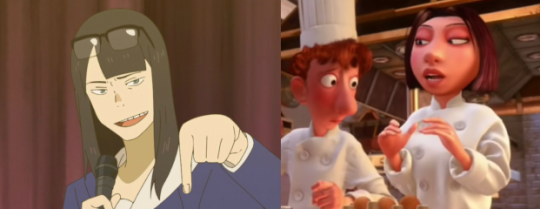
Colette and Kanamori serve well as the anchor for our respective characters; we can’t just have the four characters go nuts with whatever, there needs to be some stability, a reality to the ambitious madness that can come with creating. Kanamori isn’t teaching the two any ground rules of anime, but she understands the analytics and guidelines to keeping things on track. Colette helps Linguini, by extension Remy, on the known etiquette to being productive in the kitchen, the same can be said for Kanamori in helping Tsubame and Midori in getting the film done clean and timely. While making a meal isn’t the same as making a whole cartoon, the ins and outs of getting things done have a parallel organized track. There’s especially more to making animation, especially on a deadline, and I’m glad Eizouken doesn’t shy away from giving you the thought process in what might go on behind the scenes; it practically gives you the ropes on what could happen if you were in each of the trio’s shoes.

Additionally, these two are the most resolute of the three characters; they stick to the mission understanding where Remy and Midori are philosophically, and Tsubame and Linguini are fundamentally, coming from. She and Kanamori exhibit the practical outsider, the one to truly stick their neck out, don’t put up with bullshitting, to push the creative drive further. Both see the weight that comes to production and while Colette has her fallback in the 3rd act, they make sure everything goes as planned. They truly practice what they preach and are the glue that holds things together. The only disadvantage Colette has is that she lacks a relationship with Remy, it’s mostly indirect at the end while Asakusa and Kanamori are initially on better terms since they were already close friends. But with our characters on the move, there’s hardly such thing as a perfect run,,,,
The Fallback
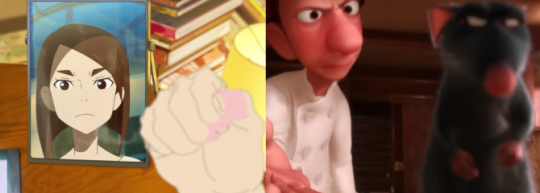
This part is where Eizouken and Ratatouille truly divide because the problems that arises for our characters come in differently. Ratatouille has more outside factors coming in with the fact that Remy is a rat and is pulled between his connection with humans vs his own kind. Eizouken is more in-fighting between the three where Tsubame and Midori’s ambitions have to face off against Kanamori’s more realistic shut downs and options. Eizouken also presents the compromises that can come with being a creator where Ratatouille reasonably montages through the hardships that can come with human puppetry and becoming an instant hit in the kitchen. Success is portrayed more consistently in Ratatouille than in Eizouken, which focuses more on the progress. It’s obvious given that, again, making food is not as time and energy consuming as making a feature; we see that animation is a lot more than just drawing all your ideas onto the equivalent to a flip book.
To sidetrack a bit, I came to agree with Jim that Monsters University is the antithesis to Ratatouille where the hard work that one puts into their dreams doesn’t mean imminent or easily delivered success. It’s a bizarro film in that, while not breaking new ground plotwise, MU is grimly realistic in that your passionate drive won’t always lead to getting the spoils you exactly want. Eizouken cleverly sits the middle of the two, where success is achievable if you put the effort in, but that effort realistically won’t go exactly how you want. Mizusaki wants everything hand-drawn and Asakusa wants a story, but come to understand that shortcuts need to happen if they want to get it done by the council meet. Kanamori isn’t crushing their aspirations for the hell of it, she makes it clear that time and the student body are not on their side. As opposed to Ratatouille, the final boss that are the critic(s) are notably secondary to getting the project done somehow. As mentioned before, I’m glad Ōwara made Tsubame already apt in animating because we can focus less on her being able to do it, more on the limitations that come with doing it. She has the skill, but has to bargain on her capabilities with what’s necessary as we see the tolls that come with the job.

Where I say these two collide somehow is the facet of the outsider putting the effort in for their goals. Remy and Midori are gifted and near encyclopedic in their trades, but are reasonably setback by both internal conflicting question of how far are they willing to go in exercising their drives. Remy more external than Midori since he could literally be killed if the truth was out too soon, but there is that self doubt in both of them where it can be hard to imagine that anyone can cook or that creating the great world is possible. It’s near the end of the arcs where they truly stand up for their beliefs and I appreciate that both handle the determined directing of our MCs in a respectable, pretty relatable way. They finally get to call the shots. They never sacrifice what could’ve been for what could be dauntingly realistic either; both offer an organic sense of optimism. But, with this optimism, comes the endgame that truly puts it all to the test in...
The Moment of Truth

Mr. Anton Ego, Skinner, and the Student Council are undoubtedly the final piece to these puzzles. It’s smart that they’re only present by the end of the arcs, only mentioned initially as the antagonistic force Remy and the Eizouken need to convince; they didn’t need to shoehorn their looming gavels any further. Naturally Skinner parallels the council president, a disingenuous hothead that antagonizes our MCs in a more unfair light while secretary Sakaki represents Ego, an intellectually honest person with actual standards and can see the forest for the trees. Eizouken’s episode 4 perfectly conceives why Kanamori is the boss, as she effortlessly confronts the allegations against them; not so much bluffing as she is spotlighting the council’s rash judgement. Unfortunately Kanamori can only debunk them so far, which leads to Midori overcoming her anxiety to demand that they’re given a chance. It’s great that Asakusa can suffer in silence for only so long before pushing herself to say something. This falls in line with Remy’s dad showing his son the grim realistic front of humans and rats before coming back to help him when he realizes Remy’s determinism. It’s like the rat says, the only way to go, “With luck, forward.”

Like the scene where Ego eats the titular dish, the moment we finally see the anime in full is almost disgustingly perfect. It’s fitting that a riot was going on before the presentation only for the action packed film to essentially come to life and throw chaos right back at everybody with powerful air waves, tank shells, and the tank itself jumping off the screen, literally blowing the audience away. Eizouken has literally more louder of a scene than Ratatouille’s, but both offer that climatic impart equally hard in their respective moments. They don’t shy away from grasping that immersive feeling of what you loved the most about food and/or animation, those invested in the film/series are basically with Ego and the student audience as those moments happen. It kinda hurts the brain how perfect these two moments are. Eizouken and Ratatouille, in a meta sense, weren’t successful only because they poke at our nostalgia or love, but of how they go the mile to convey it significantly. Ratatouille by the end, thanks to Ego, provides the apt idea of open-mindedness; that greatness can come from anywhere. Eizouken does this but adds the step that being open-minded can come with seeing what the efforts of that determined greatness can lead to. And with this, we see how it ends, or how it begins...
The Step Forward

I mentioned this before, but I loved that immediately after their demo reel finished, they weren’t worrying about any approval from the council or audience but discussing about what to improve on next. We see the soon boundless enthusiasm of the trio when, regardless of , they want to improve and do more as a team, all while the secretary approves the club in the hopes to see the fruitful potential. Compare this to Ratatouille for while Remy succeeds in convincing his family and Ego of his talent, they don’t sacrifice realism too much. Gusteau’s is naturally shut down, rats and humans aren’t suddenly living together by the end. At the same time, the movie wasn’t really about that, but about achieving small victories, optimistically grasping that palpable progress. Like Eizouken, Ratatouille leaves us with the progressive prospect that there’s the potential for more, for better.
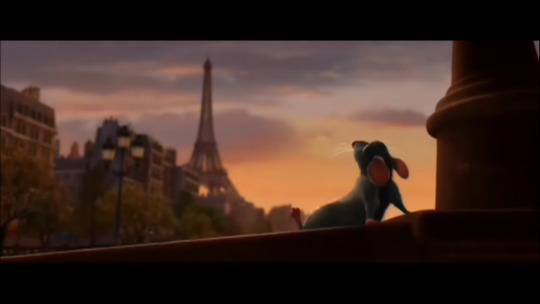
To quote Jim once more, I say what makes both Eizouken and Ratatouille work fundamentally is that they keep the finger on the pulse of their respective message(s) while still creating enjoyable moments; they don’t sacrifice the fun of getting things right for pushing why it matters. They don’t sellout the bonds between our characters for irreverent romps in the kitchen or studio. Both offer a meaningfulness to their respective crafts, blending its many flavors into a well made dish that explores what it means to create and the steps that come with it. What it means to have passion and utilize that to its capable extent. What it means to enjoy a meal while watching an impressively finished production. They’re also very well animated; thanks Yuasa and Bird.
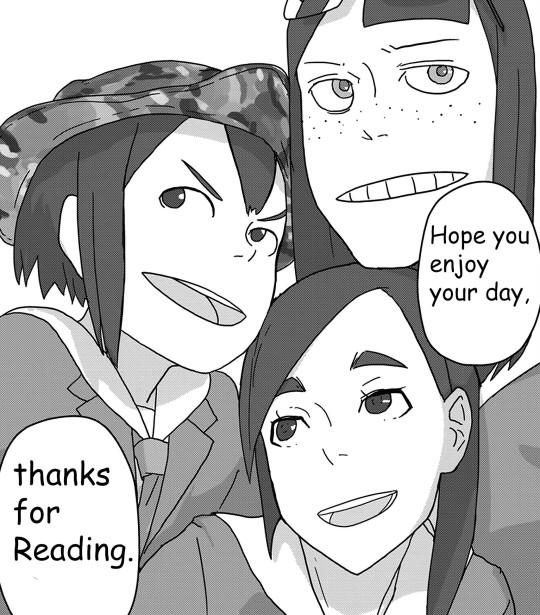
#keep your hands off eizouken!#keep your hands off the motion pictures club!#eizouken#eizouken anime#KYHOE#Ratatouille#pixar#disney#anime#animation#critique#analysis#Good Stuff#long post
142 notes
·
View notes
Text
Deltarune Theory - The Red SOUL
It’s pretty clear that, in Deltarune, the person we are “playing” as is not Kris directly, but the red SOUL that is controlling them.
After all, when Kris tosses the SOUL out of their body, we can still control it.
So then, the question is... Who IS the red SOUL?
In this post, I’ll go over several theories, their main points, and evidence for them and against them.
It’s not Kris’ SOUL.
With the information we have, it’s nearly impossible for this SOUL to belong to Kris.
First of all, in the Dark World, Kris’ description describes them as follows:

“Body contains a human SOUL.” Not “THEIR” human SOUL, “A” human SOUL. That’s just about the most suspicious-sounding way you could possibly word that.
Second, the first time we go to save the game, a save file titled “Kris” is overwritten by one with the chosen name of the “creator”.
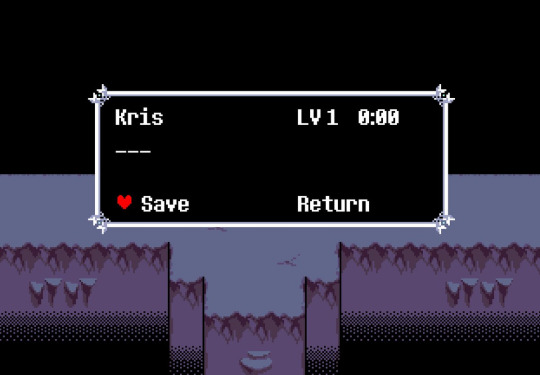
And, throughout the epilogue, everyone keeps pointing out how strange they’re acting, how they aren’t like themself...


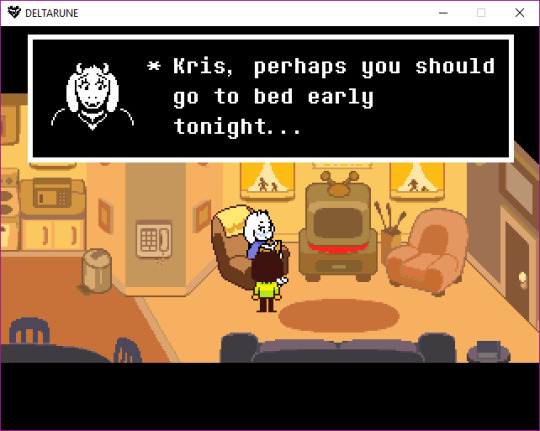

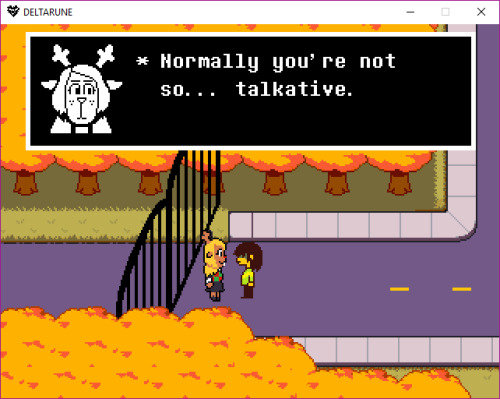
They’re acting unlike themself because they aren’t themself - they’re being controlled by someone else.
... Someone who knows some things Kris doesn’t.

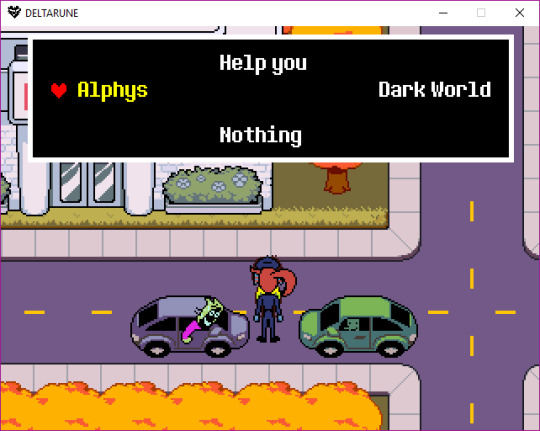
(Because of the above two, I’m going to assume that all of the dialogue choices come from the red SOUL.)
The SOUL also seems a little, um, opinionated:
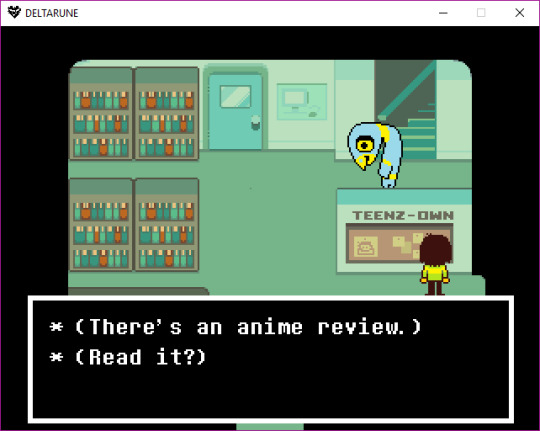

And they apparently don’t know who Rudy is, when Kris definitely does.

So... who could they be?
Theory 1: The Player (“Player Theory”)
This is probably the most popular theory going around right now. In this theory, the red SOUL represents us, the “player”, as an actual in-game entity.
This is an understandable interpretation, as Undertale is known to be very meta at times. It’s not totally unthinkable that ‘we’ exist as an actual force in-universe.
Evidence against Player Theory
There’s a significant amount of evidence that the red SOUL has their own personality and is their own person, such as:

They have their own opinions on Mew Mew 2.
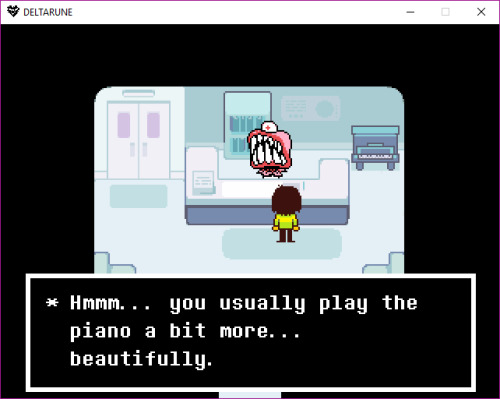
They can’t play the piano. I’d imagine a lot of players can, so it’s strange to put this here if they’re meant to be the player. It would be odd to exclude a significant amount of the player base (including Toby himself) for, um, literally no reason.
Support for Player Theory
According to Deltarune’s official website, Deltarune is a game “intended for people who have completed UNDERTALE.” Therefore, the “player” is supposed to know everything that happens in Undertale.
Therefore, these interactions make sense:
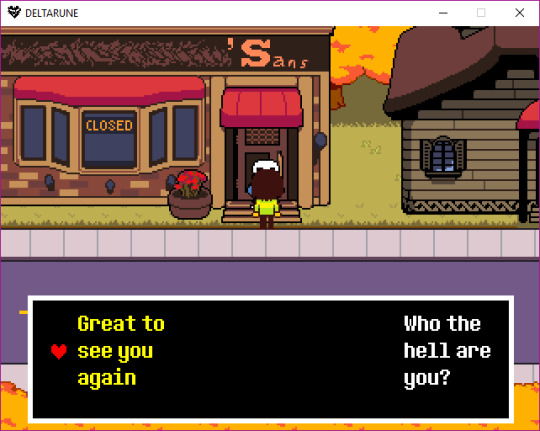
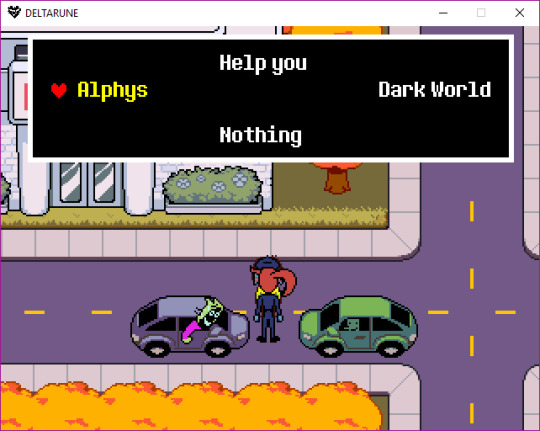
... Because the player knows who Sans is, and they know that Alphys and Undyne were dating in Undertale.
...However, there is someone else who knows all the same things about the Undertale universe that the player does.
Theory 2: Frisk
From Undertale, we know that Frisk has a red SOUL. This theory says that the red SOUL present in Deltarune is also the very same Frisk from the Undertale universe.
Evidence against Frisk Theory
Toby has said this about Deltarune in relation to Undertale:

...so, that shoots a bit of a hole in this... but. Hear me out.
[EDIT]
On February 14th 2019, a FAQ section was added to the official Deltarune website. One of the questions is:

Basically confirming that there are “connections” between the Undertale and Deltarune universes.
So... I guess there isn’t any evidence against this theory, now.
[END EDIT]
Support for Frisk Theory
Like the “player”, Frisk knows everything that happened in Undertale. They’re friends with Sans, so they would be excited to see him. They know Alphys and Undyne are dating, so they would be eager to ask Undyne about her girlfriend. And they don’t know who Rudy is.
And, of course... there’s the intro sequence.
Gaster prompts us to create a “vessel” to hold our SOUL...

A vessel that just so happens to always have exactly two stripes on their shirt.
However, the person that interrupts the intro - Chara, if you remember my post about it - doesn’t seem very happy about this whole vessel thing.
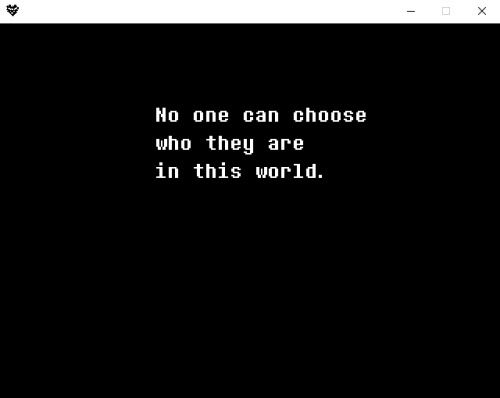

... Which would make sense if the red SOUL is actually Frisk. Frisk is Chara’s friend, Chara wouldn’t let Gaster suddenly try to turn them into a whole different person. So... What if Chara was actually trying to say “Your name is Frisk”, but was cut off?
After all, in Undertale, there’s a scene that this is likely meant to be a parallel to...
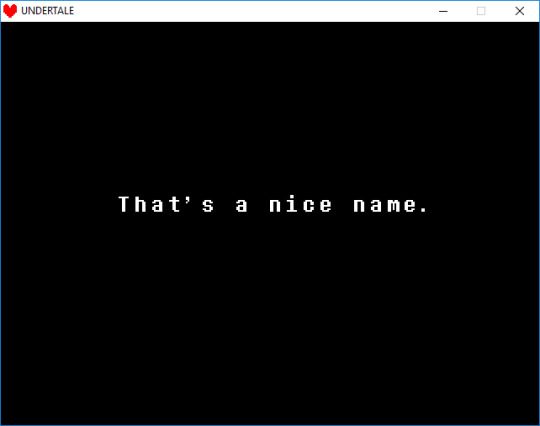

... And, of course, after beating the game, we know the speaker of this line is Asriel, and he was saying, well, “My name is Asriel”.
Speaking of Chara... the voice of the narration in Deltarune is suspiciously similar to Undertale’s, and at some points, seems to almost intentionally call back to Undertale.

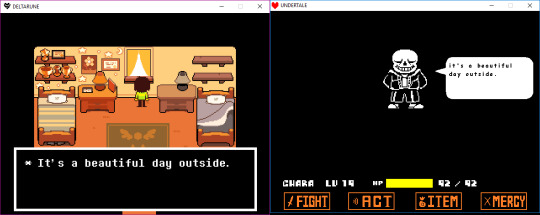
(In case you’re not convinced by the above one - it matches word-for-word in the official Japanese translations, as well.)
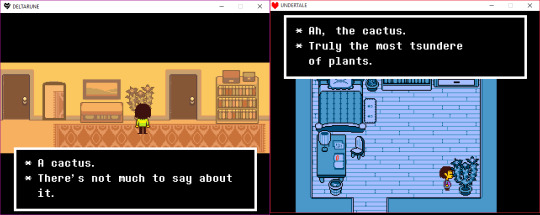

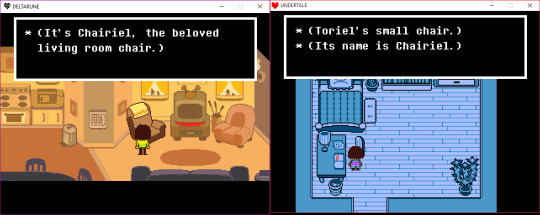

...Which would make sense if, not only are we playing as Frisk once again...

...But Chara is the narrator once again, as well.
Of course, Frisk themselves could just as easily be the narrator. It’s difficult to tell at this point. I’m personally leaning towards Chara, though.
Also, it’s probably just a bizarre joke, but this line would make a lot more sense if the person controlling Kris was actually a child:

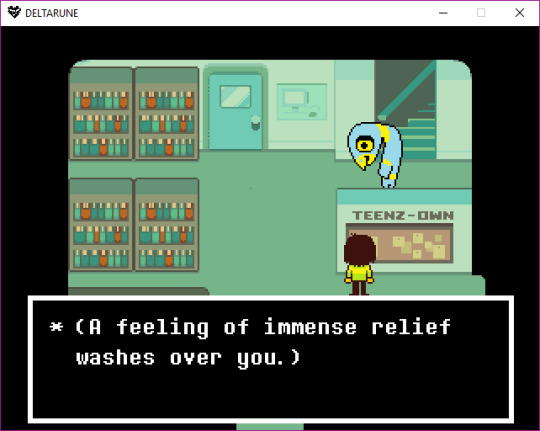
My favorite thing about this theory is that if it is true, Toby would have tricked us into thinking Frisk is actually an in-game representation of the player not once, but twice.
Theory 3: Chara and Asriel’s Combined SOUL
This theory proposes that the SOUL is a combined human-monster soul - specifically, Chara and Asriel’s.
It’s said in Undertale that Asriel absorbed Chara’s SOUL, and then died. However, it’s never explicitly stated that the SOUL shattered. We know that a human SOUL can persist after death presumably indefinitely if preserved properly, and a boss monster SOUL can survive outside the body for a few seconds... But we don’t know how long a combined human-monster SOUL could last outside its body.
Evidence against Combined SOUL Theory
There’s no evidence in the game that the SOUL belongs to two people. In Undertale, Asriel states that when he and Chara were sharing a SOUL, control was split between them, and they were both actively fighting for control over their body.


There isn’t any instance of any sort of “internal argument” within the SOUL. Unless you interpret the differing dialogue choices as such, but even so, you’d think there’d be more of a hint that there’s actually two people fighting for control. But who knows, maybe it’ll only become more obvious in later chapters...?
Support for Combined SOUL Theory
The red SOUL is... odd. And I don’t mean their personality, I mean the SOUL itself.

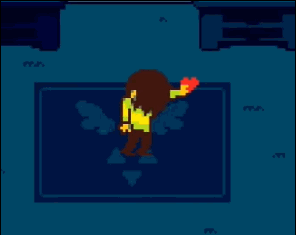
(screenshot and gif from this post, which is what inspired this theory!)
When Kris removes the SOUL from their body... It glows red and white. White, of course, is the color of a monster SOUL.
While it could just be a visual effect... It’s at least one more thing to be suspicious about.
And, like I touched on before, we never know what exactly happened to Chara and Asriel’s combined SOUL. Some people think it could even be the red heart in this machine in Undertale’s True Lab:

... and, with this theory... perhaps that machine might be somehow connected to the Deltarune universe.
Theory 4: Suzy
No, not Susie, Suzy! The one from Undertale. If you don’t know who I’m talking about, read this post.
This is my personal favorite theory, even though it’s quite unlikely. The premise of this theory is that Suzy is actually a human, and the red SOUL belongs to her.
Of course, a lot of people think “Suzy” is simply the Undertale universe version of “Susie”. That’s fair, and that theory certainly fits in with “fast approaching”. But I’m going to assume they’re completely different people for the sake of this theory. (Plus, why would Susie be the only character with a different name from their Undertale counterpart..?)
Evidence against Suzy Theory
This theory doesn’t have an explanation as to why the red SOUL knows about Alphys and Undyne’s relationship. (If you can come up with one, please tell me.) I mean, even though she exists in the Undertale universe, they only get together at the very end, and Suzy almost certainly wasn’t there. But who knows. Maybe she’s been shipping them the whole time. /s
Also, as much as I love the concept, it is quite unlikely that Suzy is a human. I do have a couple of explanations for it as you’ll see below, but I will admit that it’s still kind of a stretch. Still, what’s theory-making without a little fun?
Support for Suzy Theory
No matter whether or not Suzy ends up being the red SOUL, or even a human, she has to be in the full version of Deltarune. And, considering what we know... It’s not a stretch at all to think she might be in the very first chapter.
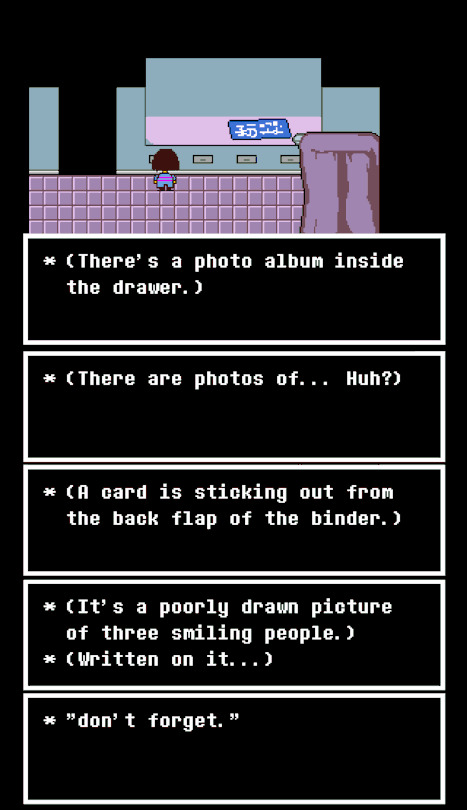
“Don’t Forget.” The title of the main theme of Deltarune is a phrase that is specifically associated with Suzy. In Undertale, you can only see the “don’t forget” note in Sans’ lab after speaking with Clamgirl and, consequently, learning about the existence of “Suzy”. Therefore, the phrase “don’t forget” is intrinsically linked to her.
This note also gives us another hint about who Suzy is: She knows Sans.
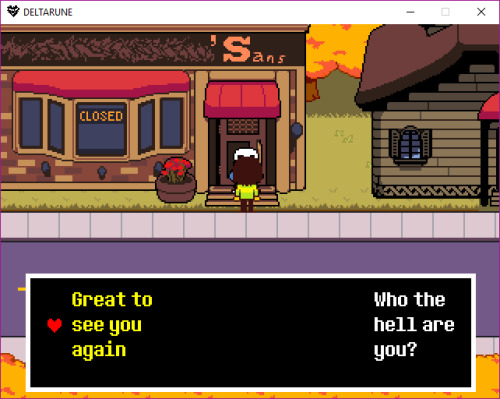
... Hm.
And, of course, her knowing Sans in combination with the fact that you only learn about her when you have certain “fun” values... it’s likely she knows Gaster, or at least of him.


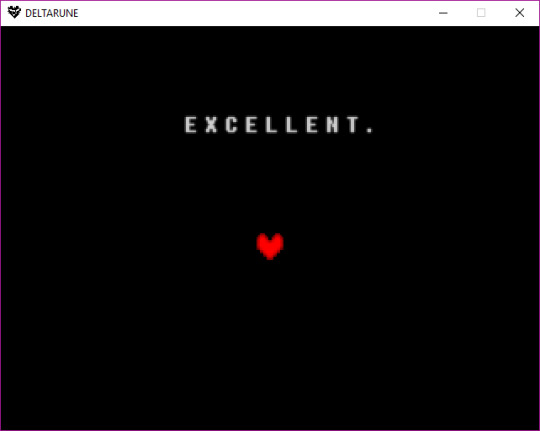
Okay, I think you see where I’m going with this...
Now, for the “Suzy is a human” part. I’ve actually had this theory since before Deltarune, but I never made a post about it or anything.
In Undertale’s No Mercy route, Sans says something quite... interesting.
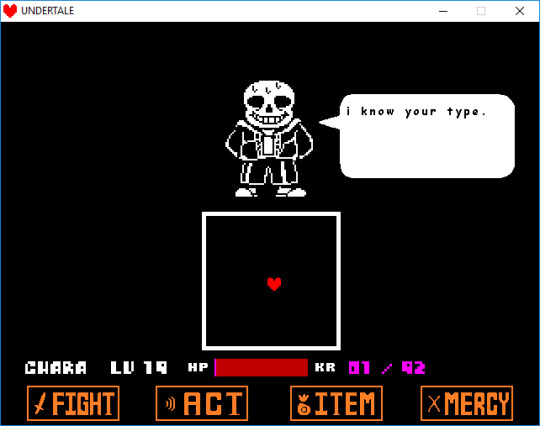
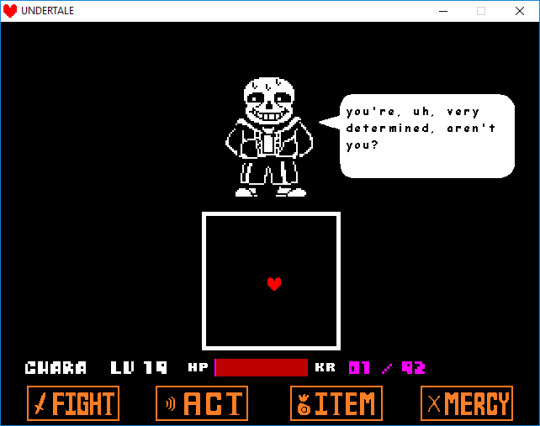
This line of dialogue implies that Sans knows or knew someone with Determination. A lot of people theorize that this line is referring to Gaster, who may have injected himself with Determination, which is a valid theory... However, I think Sans knew a human. Specifically, a human girl named Suzy.
Sans also knows a lot about concepts such as “LOVE” and “EXP”, and has secret passwords for “time travelers”. This implies that not only did he know someone with Determination, but likely with someone with the ability to “saving”, “loading”, and “resetting”... and, combined with what he talks about in his fight about “knowing our type”... it’s likely this person did a “no mercy run” in the past, or at least killed a significant amount of people.
Wait. If Suzy is a human, and she’s still alive in Undertale... How does she manage to survive in a world of monsters who need just one more human SOUL to break the barrier?
Well.
I have a few theories...
Sub-theory 1: LOVE
I mentioned before that if Suzy is a human, it’s possible, even likely, she has high LOVE.
And, well..
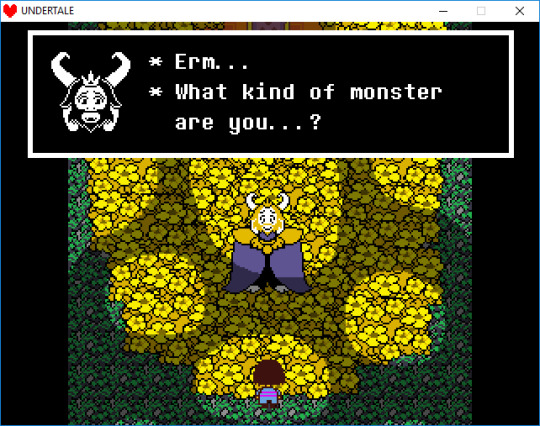
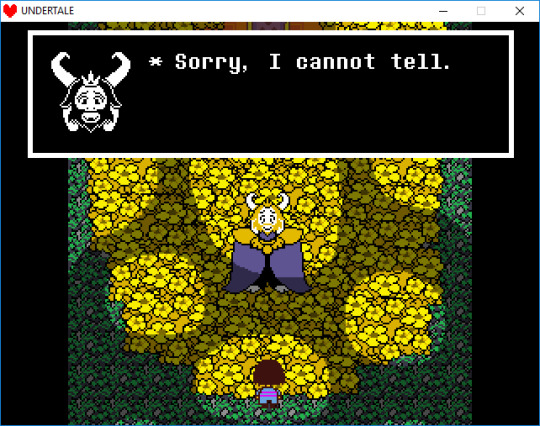
Apparently, once you reach 20 LOVE, you become completely unrecognizable as a human being. Even to the king of all monsters, who would otherwise even compare Frisk to his own dead human child.
Sub-theory 2: “Goner” form
Clamgirl’s “fast approaching” line shows us that, apparently, some people can switch between their “normal” forms and their “goner” (grey) forms at will.
If a human had this ability... perhaps their SOUL would also turn grey? Then it would appear more like a monster SOUL than a human one. Sure, it would still be upside-down, but it’s an interesting thing to think about.
Speaking of “goner” forms...

In the files, Deltarune’s vessel creation sequence is called “GONERMAKER”.
Sub-theory 3: She’s not fully human
Remember earlier how I mentioned how the red SOUL glows red and white in the ending sequence, and how that could possibly be a hint towards the SOUL being not fully human? Well, that could apply here, as well. It’s possible Suzy could be half-monster, but we don’t even know if that’s a possible thing. I’m thinking that perhaps she could have had her SOUL infused with monster magic or dust or something of the like, since it’s likely Gaster experimented with SOULs at some point.
Sub-theory 4: Someone is hiding her/concealing her identity as human
Since Clamgirl talks about Suzy being her neighbor’s daughter, it’s possible her parent is protecting her or even hiding her. I’m not sure how exactly this would work, but it’s a possiblity.
There’s also a few other things I’d like to mention about this theory that I couldn’t fit in:
1. Clamgirl tells Frisk that “In life’s grand scheme, [Suzy] might be why [they] came here in the first place”. This could be implying that Frisk knows Suzy from the surface, which would support the theory that she’s a human. However, it could just as easily be Clamgirl going on about how Frisk and Suzy are fated to meet, especially considering Clamgirl’s phrasing makes it seem like Frisk and Suzy haven’t met before.
2. Clamgirl’s “Fast approaching” line only appears in the Switch version of Undertale, which was released less than two months before chapter one of Deltarune came out. There are 3 possibilities you could take from this:
a. Clamgirl was lying (unlikely)
b. Deltarune’s release was a distraction from some more content coming soon that will actually feature Suzy
c. Suzy is in chapter one of Deltarune.
Conclusion
Anyway, those are the four theories I could come up with on who the red SOUL could be. It could also be a completely new character. Who knows.
Well, now that you’ve read this far... I’d actually like to gather some data. I’m curious what people think the most likely outcome is after reading this. If you could take a few seconds to vote on this poll, I’d really appreciate it!
475 notes
·
View notes
Text
Sea Of Solitude Review - Adrift
New Post has been published on https://gamerszone.tn/sea-of-solitude-review-adrift/
Sea Of Solitude Review - Adrift

Loneliness exists on a broad spectrum that isn’t always synonymous with simply being alone. It’s a state of mind, an overwhelming feeling of isolation that can still affect a person even if they’re surrounded by loved ones and friends. Sea of Solitude understands this all too well. Its opening cutscene begins with a poignant musing: “I have family. I have friends… And yet here I am, feeling lonely. Again.” Sea of Solitude is a game about loneliness that’s very personal for the 12-strong team at German developer Jo-Mei Games, and it shows. It tackles the subject matter with a deft touch, exploring the myriad ways these feelings of isolation, sadness, and anger can impact people’s lives in a refreshingly authentic way, using the backdrop of a puzzle-platformer to tell its story.

Click image to view in full-screen










You play as Kay, a young woman who inhabits a world where lonely people are transformed into monsters. Kay is a monster herself, so she’s desperately trying to find out why this happened and how can she can return to her human form. The rest of the narrative spirals out from this core concept, forcing Kay to confront her past and her relationships with the people around her. Loneliness affects different people in different ways; a lonely child who’s struggling to make friends at school has different needs than someone going through a breakup or someone who’s just moved to another country where they don’t know anyone, for example. Sea of Solitude shines an introspective light on the various ways loneliness can affect people, doing so through Kay’s interactions with other characters and the monsters that reside in this world, whether they’re antagonistic or seeking help.
The voice acting in these moments is uneven amongst the small cast of characters, however, the consistent writing is a strong point throughout. Conversations feel very raw and are oftentimes uncomfortable, yet Sea of Solitude manages to sprinkle in moments of levity to offset the otherwise bleak subject matter. The ending lacks closure in a very realistic and human way, but the story’s profound throughline of self-discovery and healing naturally reaches an empowering conclusion.
The story’s profound throughline of self-discovery and healing naturally reaches an empowering conclusion
Each aspect of Sea of Solitude has some kind of underlying meaning, and these are frequently conveyed through the use of both literal and figurative metaphors. The sea is one of the more blatant allegories at its disposal, as the entirety of the game takes place upon the undulating waves of a flooded city. Being alone on a small boat is inherently isolating; you just have to imagine the terrifying feeling of being marooned or adrift at sea, far away from civilization in an unpredictable environment that can deviate from being calm to violent at the drop of a hat. Kay uses this small vessel to traverse the flooded streets of the Berlin-inspired city, utilizing some basic platforming to get around when on dry land. Her interactions with the various monsters that populate the city are the catalyst for everything that follows. There’s a familiarity to each monster’s design, with the vast majority of them being reminiscent of specific animals, albeit in a fantastical way. Each one shares a mutual feature in the form of jet black fur and unsettling red eyes, but they’re often human at their core, transformed into monsters due to their disparate struggles with loneliness and anguish.
You spend much of the game coaxing the human side out of these ghoulish beasts by confronting Kay’s own past and dispelling the corruption that’s seeped into the city. Corrupted areas are bleak and coated in muted shades of grey and black, with the night sky lashed by swirling winds and torrential rain. Removing the corruption in an area by finding and inhaling it into Kay’s backpack introduces light to the world, revealing the incandescent vitality of the sun and turning the sea as blue as the sky. The stark contrast between night and day accentuates the daytime’s beauty, while the painterly art style–not to mention the nautical theme–can’t help but bring to mind the vivid aesthetic of The Legend of Zelda: Wind Waker. It’s in these moments that the “Solitude” of the game’s title is captured, presenting the positive side of being alone.
Dispersing the corruption is a task fraught with danger, however, and not just for Kay’s mental well-being. Some of the monsters are aggressive and will attack on sight. Death isn’t really an obstacle, as you’re immediately placed back right where you left off, but Sea of Solitude does manage to wring moments of tension out of these interactions. The problem is that, despite a brief three-hour playtime, it introduces new mechanics every few chapters and then drags them out until they’re nothing short of monotonous. There are numerous occasions where you have to lure spectral children into light by running close enough to aggro them, for lack of a better term, before dashing away. It’s all relatively straightforward, which isn’t a bad thing on its own, but the act of playing Sea of Solitude is never particularly engaging and mostly consists of dull mechanics that far outstay their welcome.
The story, and the way it confronts a universal but often misunderstood part of life, is Sea of Solitude’s biggest draw. The gameplay is passable at best and tedious at its worst, but this is still a journey worth experiencing because of the way Jo-Mei Games has managed to weave a heartbreaking tale out of genuine characters and believable grief. Kay wants to know why she turned into a monster, and this is the driving force behind the whole game. What could have triggered it and why are these monsters so intrinsically linked? Despite some missteps along the way, Sea of Solitude is difficult to put down until you can answer those questions for yourself.
Source : Gamesport
0 notes
Text
A Love Letter to the Fantasy Airship • Eurogamer.net
There’s a joke that does the rounds on Twitter every so often that somewhere around 2015 or 2016 we slipped into an alternative timeline. One of the bad ones where your cuddly best mate wears an eyepatch and jackboots and everyone’s suddenly got sinister facial hair. This would, in a way, be a comforting notion, except that it can easily be disproved with one simple look to the sky. If this really were a parallel world, even one of the bad ones, the sky would be filled with the silent, graceful shapes of airships gliding serenely back and forth. Nothing says ‘parallel universe’ like an airship. From Fringe to Doctor Who, from Wolfenstein to Bioshock Infinite, if you want people to know they’re on the path not taken, bung a Zeppelin in the sky and, to be honest, you may not even need the evil goatees.
I’ve had a bit of a thing for airships since I was in my teens. I loved – and love – all airships, but it was the great steampunk contraptions of wood and cloth and wrought iron that had me most under their spell. Where the ‘ship’ is taken literally and a creaking old galleon is slung implausibly and enchantingly beneath bulging balloons. Games love them too – they’re most associated with JRPGs, although I think it must have been in Super Mario Bros 3 that I first encountered them. But the airship that really sparked my love affair was in a much more obscure place. Does anyone remember the Fantastic Worlds expansion pack for Civilization 2? Anyone remember the airship units? I do. For some reason that unit captivated me. I loved it, in all its tiny, pixellated glory. I couldn’t find a picture of it. Sorry. Take my word for it, though: that was a good airship.
The history of fantasy flying machines goes back further than you might think. Both the ancient Greek playwright Euripides and the historian Herodotus give the vengeful sorceress Medea a flying chariot drawn by dragons, which she uses to escape Athens after murdering her children.
By the early first millennium AD, the assortment of tall tales that had grown up around Alexander the Great gave him a variety of fantastical vehicles and devices appropriate for a globetrotting, monster-fighting hero. As well as a submarine used for fighting sea-monsters in Alexandria’s harbour, he was also reputed to have constructed a flying machine powered by griffins, which he used to travel high into the sky and look down on the earth below, before becoming scared and hurriedly returning to terra firma. The Russian folk-tale ‘The Fool and the Flying Ship’ gets us closer to the familiar steampunk airship we’re familiar with. In 1894 this was printed for British audiences in The Yellow Fairy Book, one of Andrew Lang and Leonora Alleyne’s popular series of children’s fairy-tale collections.
Unsurprisingly, the nineteenth century is when things really hot up for fantasy airships. The first hot-air balloon flight had occurred at the end of the eighteenth century, the novel was finding its feet as a literary genre and fantasy for both children and adults was everywhere. We often think of Jules Verne when we consider steampunk vehicles and Victorian science fiction-fantasy, and he certainly did offer his share of airships – notably in 1886’s Robur-le-Conqurant. But Verne was only one of a long list of late Victorian and Edwardian writers excited by the dawning of the age of flight. Another Frenchman, the journalist and pioneer of science-fiction illustrator Albert Robida, is particularly fun. His imagined future in 1882’s Le vingtime sicle and its sequels offers future-Parisian skylines filled with airships.
Of course, the nineteenth and early twentieth centuries also saw the hydrogen-fuelled rise of the real airship. In 1875 Jean-Pierre Blanchard crossed the Channel in a powered balloon with flapping wings and there was a failed attempt to build a military blimp as early as 1812 to defend Russia against Napoleon’s invading armies. By the end of the century several successful flights had been made by motorised dirigibles, and the beginning of the twentieth century marked the beginning of the age of the Zeppelin.
We all know how that ended up.
The Hindenburg Disaster and the conspicuous failure of the commercial airship cemented its position in the world of fantasy and alternative history. For a few decades airships plied the skies, demonstrating their near-viability, but when all that was cut short the airship never had the opportunity to become a mundane part of our everyday lives. Not only that, but the imagery of the flames licking around the Hindenburg’s swastika-emblazoned tail meant those mighty Zeppelins remained inextricably linked with the Nazis, who were soon to become their own staple of the alternative history genre. Two roads not taken intertwined in popular imagination. It’s no surprise, then, that the rigid dirigible, the realistic Zeppelin-style airship, tends to be associated in popular culture with timelines where something’s gone awry, with totalitarian rule and military might.
Even before the rise of the Nazis, though, the airship lost its innocence in the First World War, when Zeppelins took part in German bombing of European cities. When games and other media have wanted to portray the airship as a force for good, associated with optimism, adventure, freedom and exploration, they’ve tended to focus on the fantastical whimsy of Victorian and Edwardian fiction, before harsh reality came along and ruined everything. It’s worth remembering that in the 80s and early 90s, when video games were coming of age, real airships would still have been within living memory of many older people. But their fictional counterparts were safely in the world of historical literature, abstracted from the mundane world as much by time and the passing of generations as by their intrinsic fictionality.
A lot of this early airship fiction comes from Europe, especially France. But video games – and their love affair with the airship – blossomed in Japan. We probably shouldn’t underestimate the importance of Hayao Miyazaki and his Studio Ghibli films in bringing airships – and the ‘sky-fi’ sub-genre in general – to Japanese audiences at a critical juncture. 1984’s Nausica of the Valley of the Wind features airships that are effectively gigantic planes, their aesthetic drawing heavily on the technology of the first half of the twentieth century in a way that’s now often called dieselpunk. Even more influential is 1986’s Laputa: Castle in the Sky. As well as more dieselpunk aircraft, we now have a wonderful array of airships. From Zeppelin-like liners to grim military dreadnaughts and ramshackle pirate ships of cloth, wood and whimsy.
These are the roots of the Mario airships, the Fantastic Worlds one, and the skyborne galleons of Skies of Arcadia. No series is more associated with this approach than the Final Fantasy series – especially the early entries. The first game in the series came out only a year after Laputa and the Ghibli influences are pronounced throughout 90s Final Fantasy. The airship was a staple of the series, with particularly notable appearances in 4 and 6, but its wood-and-cloth airship obsession reached its apex in the sublime Final Fantasy 9. Airships abound in this game, every one a love-letter to the fin-de-sicle fiction that inspired it. The airship-filled city of Lindblum is like Metropolis by way of Robida, a strong contender for the capital of dirigible aviation in gaming.
Particularly in the 80s and 90s, Japanese games’ airships found their comfort zone between the two intermingled aesthetic styles evident in the Ghibli films. Victorian-flavoured wood, cloth and steam on the one hand, 1940s and 50s dieselpunk juggernauts on the other. Often the goodies tended to skew towards the former and the baddies to the latter, like in Skies of Arcadia, where you take airborne sailing ships up against airborne battleships that could have been drawn straight out of the Second World War (not an airship as such, but obviously we have to mention the influence of Space Battleship Yamato here). The boundaries were never absolute, though. The scents of wood-polish and engine oil were always mingled. And perhaps the most dieselpunk airship of them all is a hero vessel – Final Fantasy 7’s Highwind, which from its gleaming aluminium hull to its glamorous pin-up nose-art, thoroughly converts the classic fantasy airship to the aesthetics of 1940s and 50s aircraft.
Barring the exuberant throwback that was Final Fantasy 9, the Highwind is something of a turning-point for Final Fantasy’s airships. The traditional outline of a boat-like gondola slung below a gas-filled lifting body was still there, as were the propellers and guy-ropes. But the heroes’ airship was being pushed towards something more modern. Later Final Fantasies have almost all subverted the traditional idea of the airship in some way, from the spaceships and flying universities (!) of Final Fantasy 8 to the Star Wars-influenced fighters and flying fortresses of 12. By Final Fantasy 15, the old-fashioned dirigible has been almost entirely lost in the brutalist sci-fi troop-carriers and late-game airborne concept-car that are its take on the airship idea.
That’s fine, in its way. I guess there are people out there who love those for their sleek coolness. But for me, it feels a bit like something’s been lost. Maybe it’s because I grew up in the 90s and I’m getting to an age where, as much as I love science fiction, spaceships and the futuristic, I can’t quite escape the pangs of nostalgia for the dying days of the analogue world. Nifty as exotic flying-machines held aloft by exotic glowing energy or unseen magitek are, for me they lack the sense of tangibility you get from a wooden gondola creaking precariously below a bag full of hot air. The sense of wonder and adventure to be had when you stand by the bowsprit with the headwind billowing out your greatcoat and streaming back your wonderful 90s JRPG hairdo just so. Where you can hear the chunner of a grimy old engine that runs on oil, coal and the promises of a grubby bloke with goggles and a spanner. Where an unlikely number of propellers whir to keep you aloft, and a thrilling musical theme accompanies your flight over the rolling hills and seas of the fantasy world below.
from EnterGamingXP https://entergamingxp.com/2020/02/a-love-letter-to-the-fantasy-airship-%e2%80%a2-eurogamer-net/?utm_source=rss&utm_medium=rss&utm_campaign=a-love-letter-to-the-fantasy-airship-%25e2%2580%25a2-eurogamer-net
0 notes